Beware of These 24 Terrifying Bridges From Around the World
Lifestyles
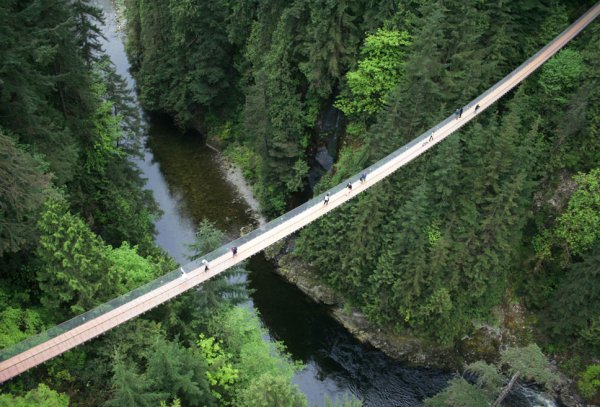
If you suffer from gephyrophobia — a fear of bridges — then you might want to avoid these particular crossings. While most of these bridges are safe to travel across, they can still make for a terrifying experience, especially if you’re afraid of heights. Here are 15 of the scariest bridges around the world, ranked in no particular order.
Here are 24 of the scariest bridges around the world.
1. Kuandinsky Bridge, Russia
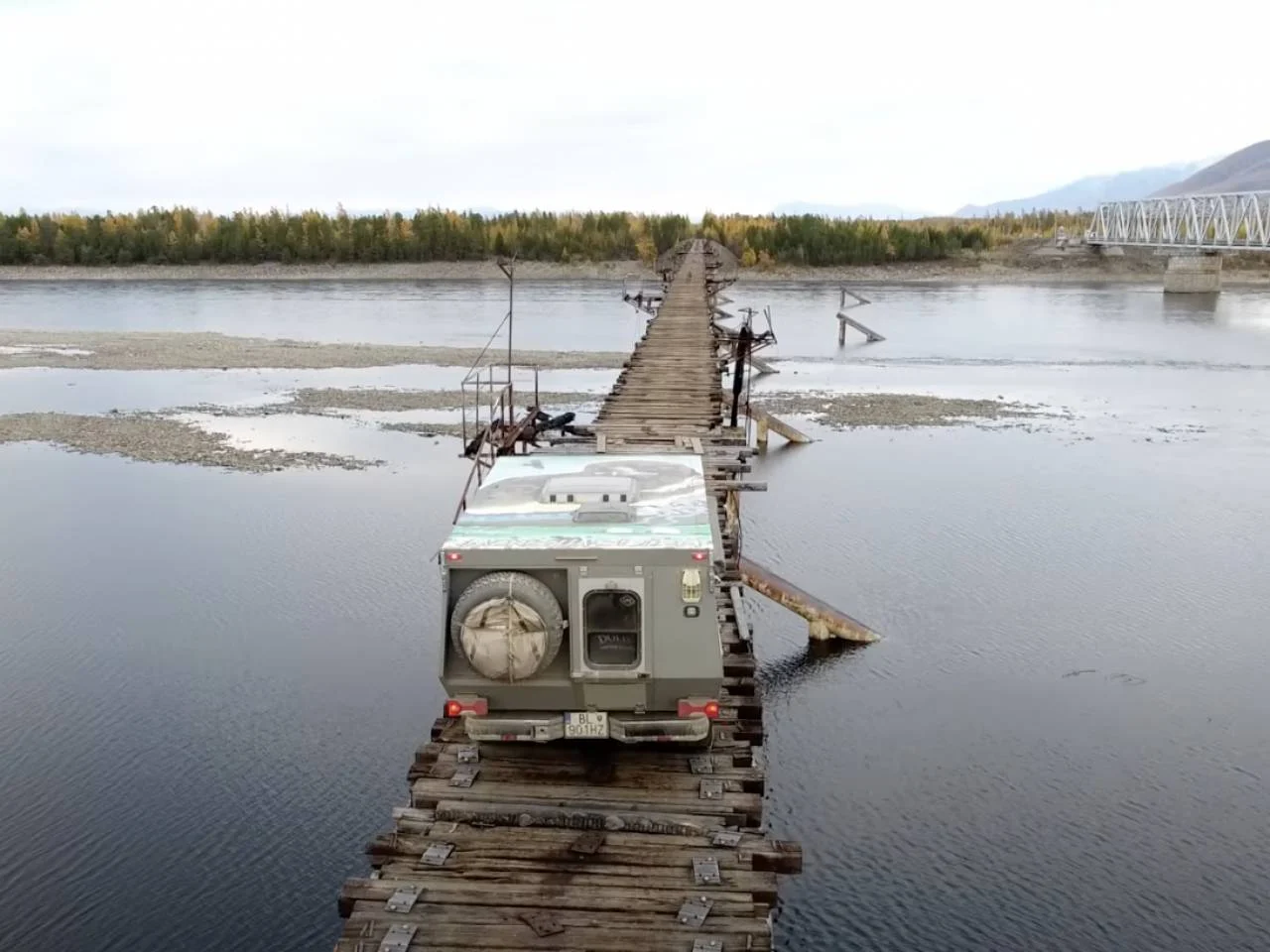 Martin Remiš / YouTube
Martin Remiš / YouTube
 Nail Asfandiarov / Shutterstock
Nail Asfandiarov / Shutterstock
We wouldn’t recommend you take a drive across this battered 6-foot-wide bridge that has no railings or safety features in the Trans-Baikal Region.
It’s even worse when it snows — the structure’s covered in wooden planks, which can get incredibly slippery — and strong winds could send daredevil drivers plummeting into the icy river below.
The 1,870-foot-long bridge — which was originally erected as part of a train crossing — hasn’t been repaired in over three decades. Although there’s a much safer, sturdier bridge built alongside it, the Kuandinsky Bridge was never actually torn down, leaving thrill seekers free to make the dangerous trip across.
2. Canopy Walk, Ghana
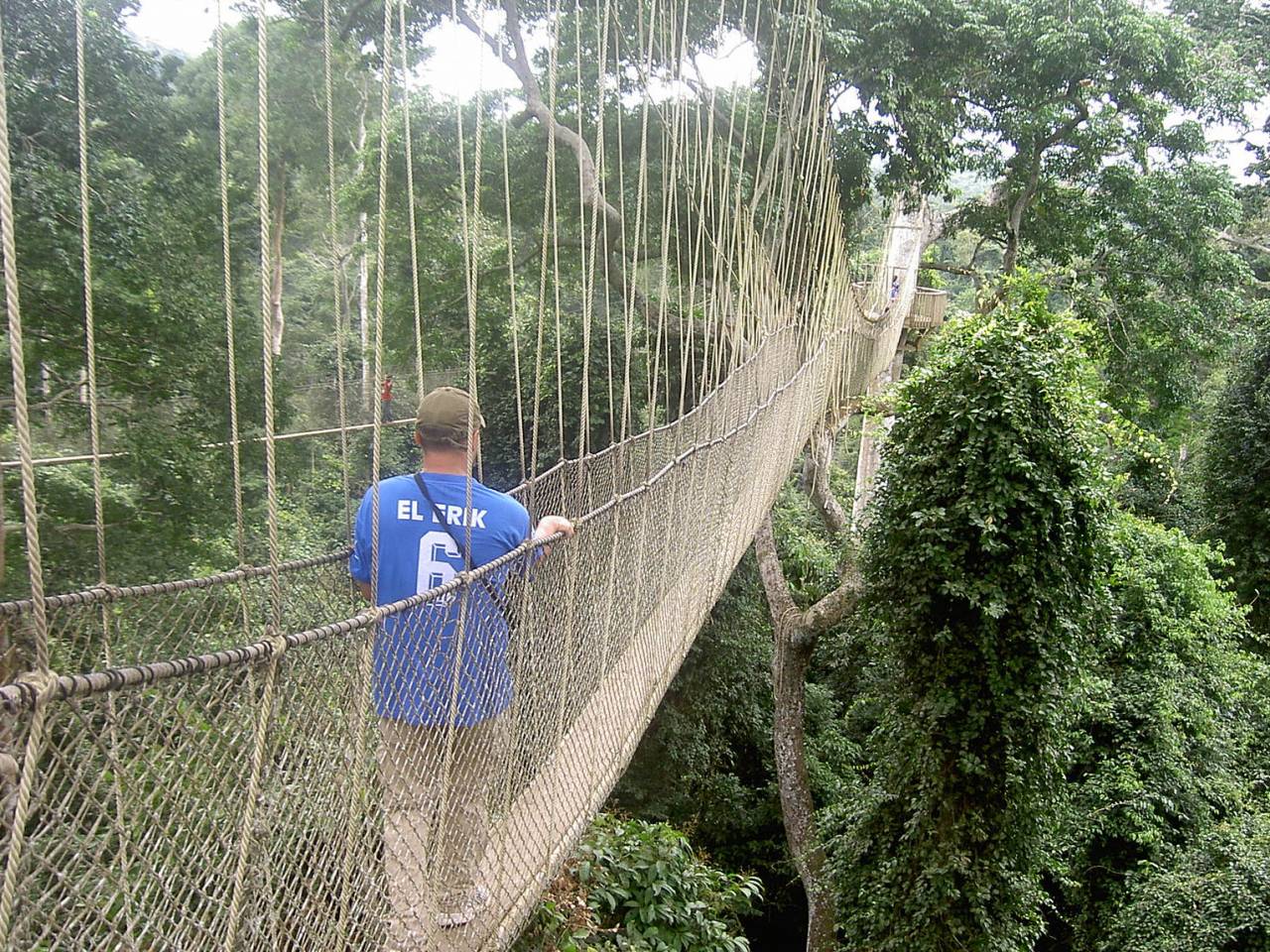 Erik Cleves Kristensen / Flickr
Erik Cleves Kristensen / Flickr
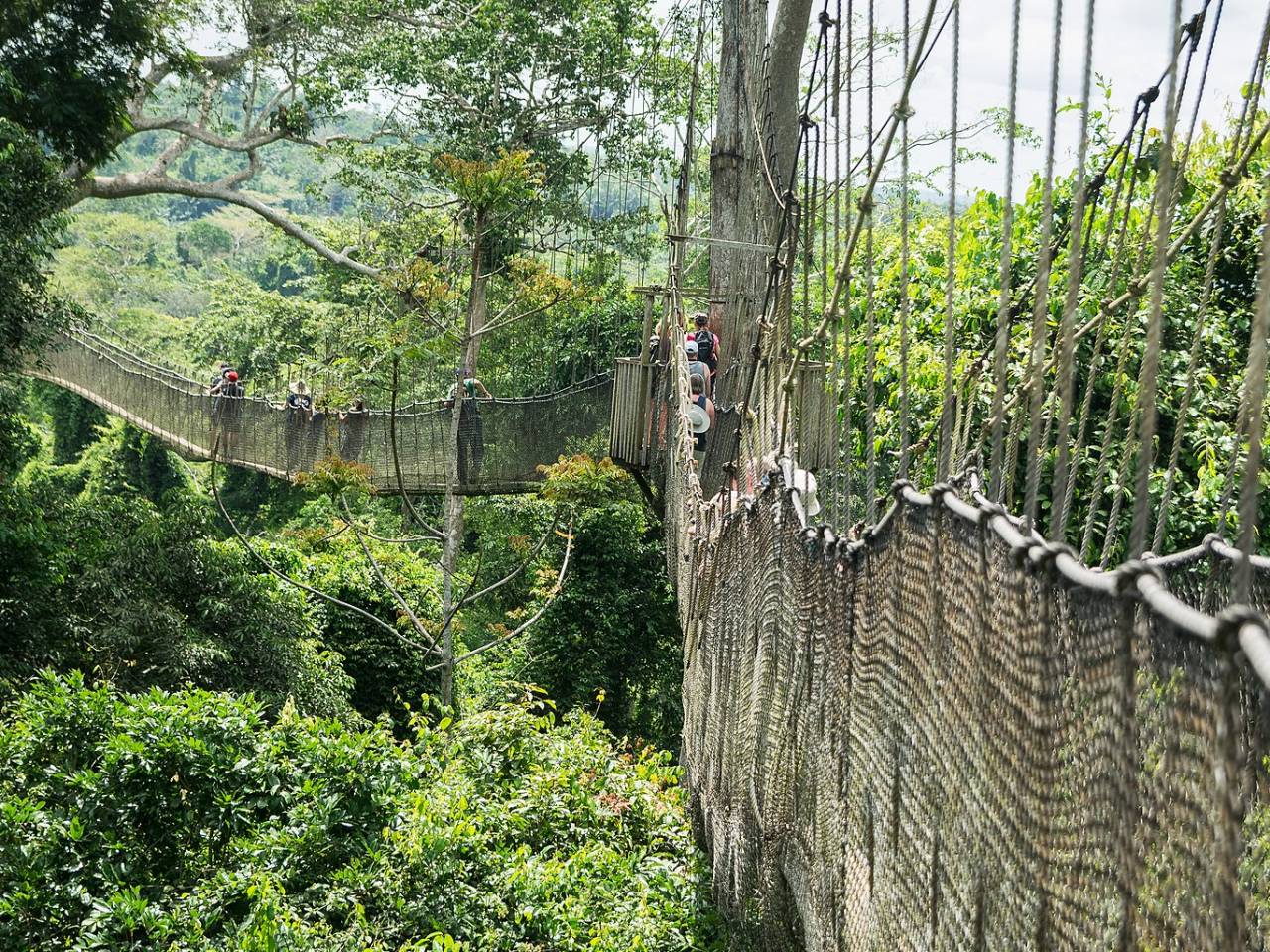 Jones Anlimah / Wikimedia Commons
Jones Anlimah / Wikimedia Commons
This rickety series of rope bridges strung throughout the lush, leafy trees in Kakum National Park was opened on Earth Day in 1995.
They were reportedly constructed to draw tourists, who could experience the beauty of the rainforest from the elevated trail — the park provides a home to hundreds of species of birds and butterflies as well as mammals like elephants, leopards and primates.
The seven bridges consist of over 1,000 feet of walkway and hang beyond 130 feet away from the forest floor. But don’t worry about missing a step and plunging off the trail. The Canopy Walk is made out of wire rope, aluminum and wooden planks, and includes safety netting along the sides.
3. Royal Gorge Bridge, Colorado
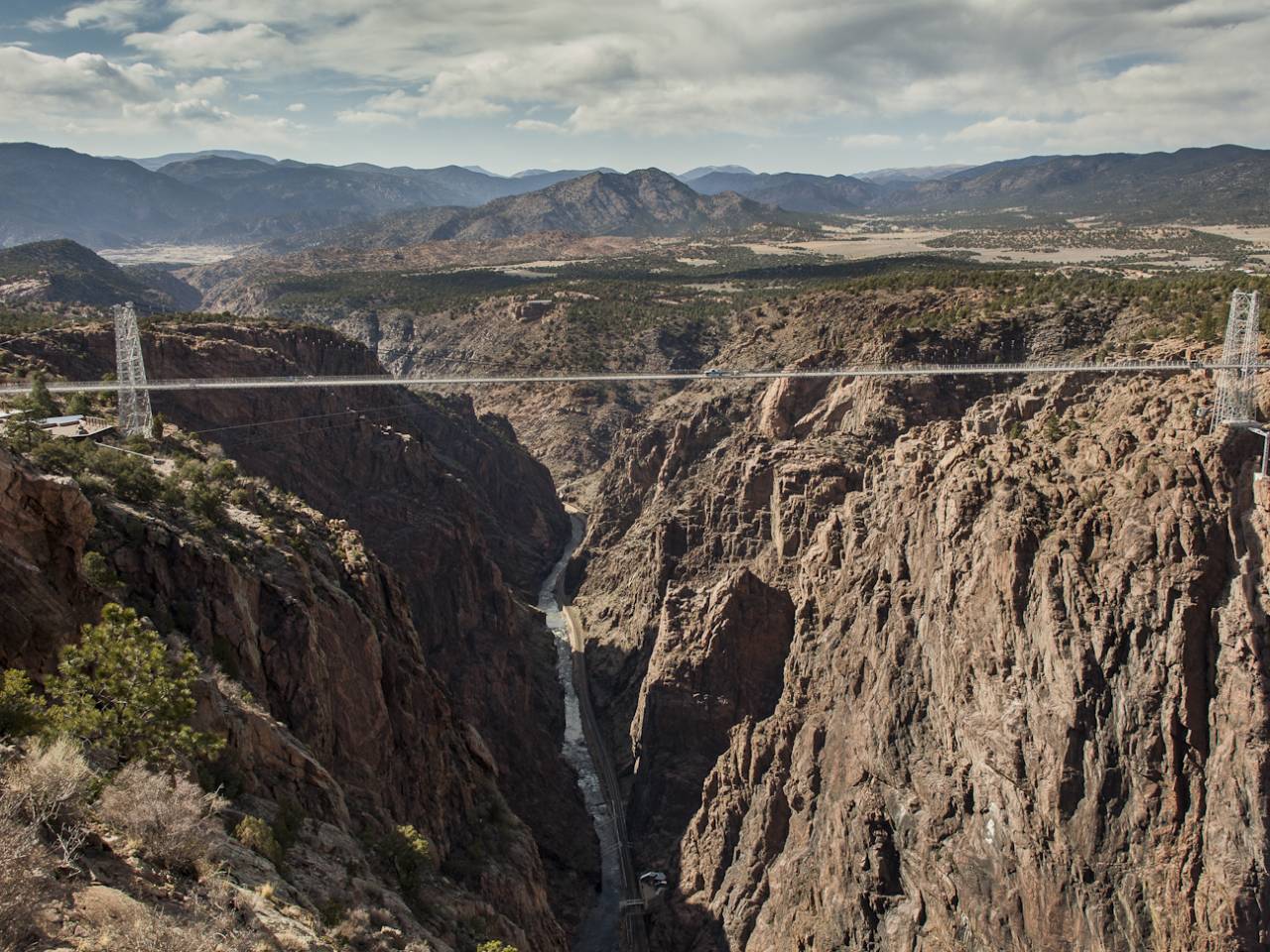 Bkthomson / Wikimedia Commons
Bkthomson / Wikimedia Commons
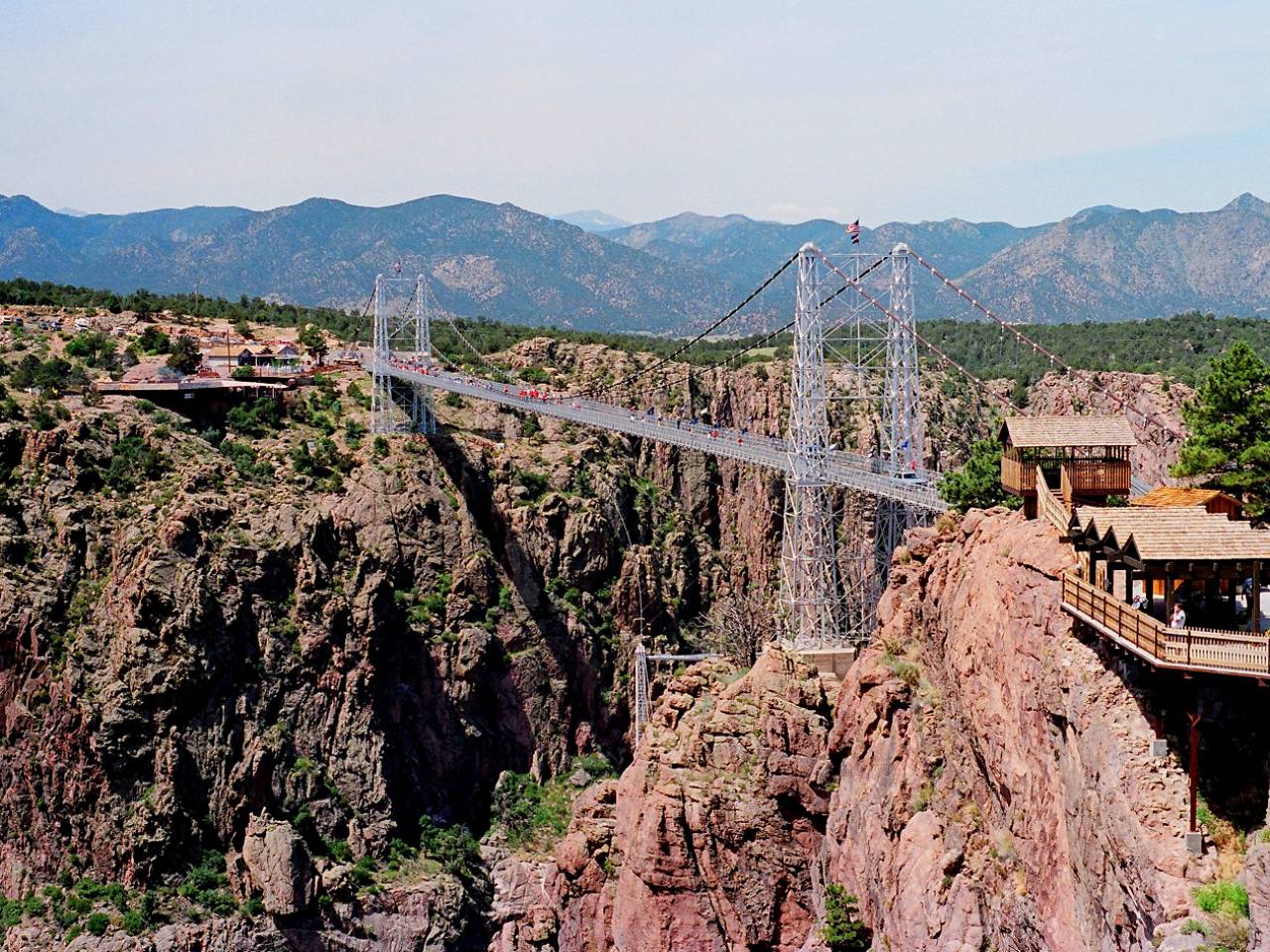 Larry D. Moore / Wikimedia Commons
Larry D. Moore / Wikimedia Commons
You don’t need to travel out of the country to drive across this jaw-dropping suspension bridge wedged between the Grand Canyon of the Arkansas.
Built in less than seven months in 1929 by a group of about 80 laborers for just $350,000, the Royal Gorge Bridge sits 956 feet above the Arkansas River and spans 1,270 feet across. If you’re not afraid of heights, take a peek below to catch a glimpse of the whitewater rafters traversing the river.
Luckily for tourists, America’s highest suspension bridge is quite safe — the bridge was designed to hold up to 2,000,000 pounds and was refurbished in 1982 with new anchor cables and a wind cable system that allows it to withstand up to 125 miles per hour winds.
4. Langkawi Sky Bridge, Malaysia
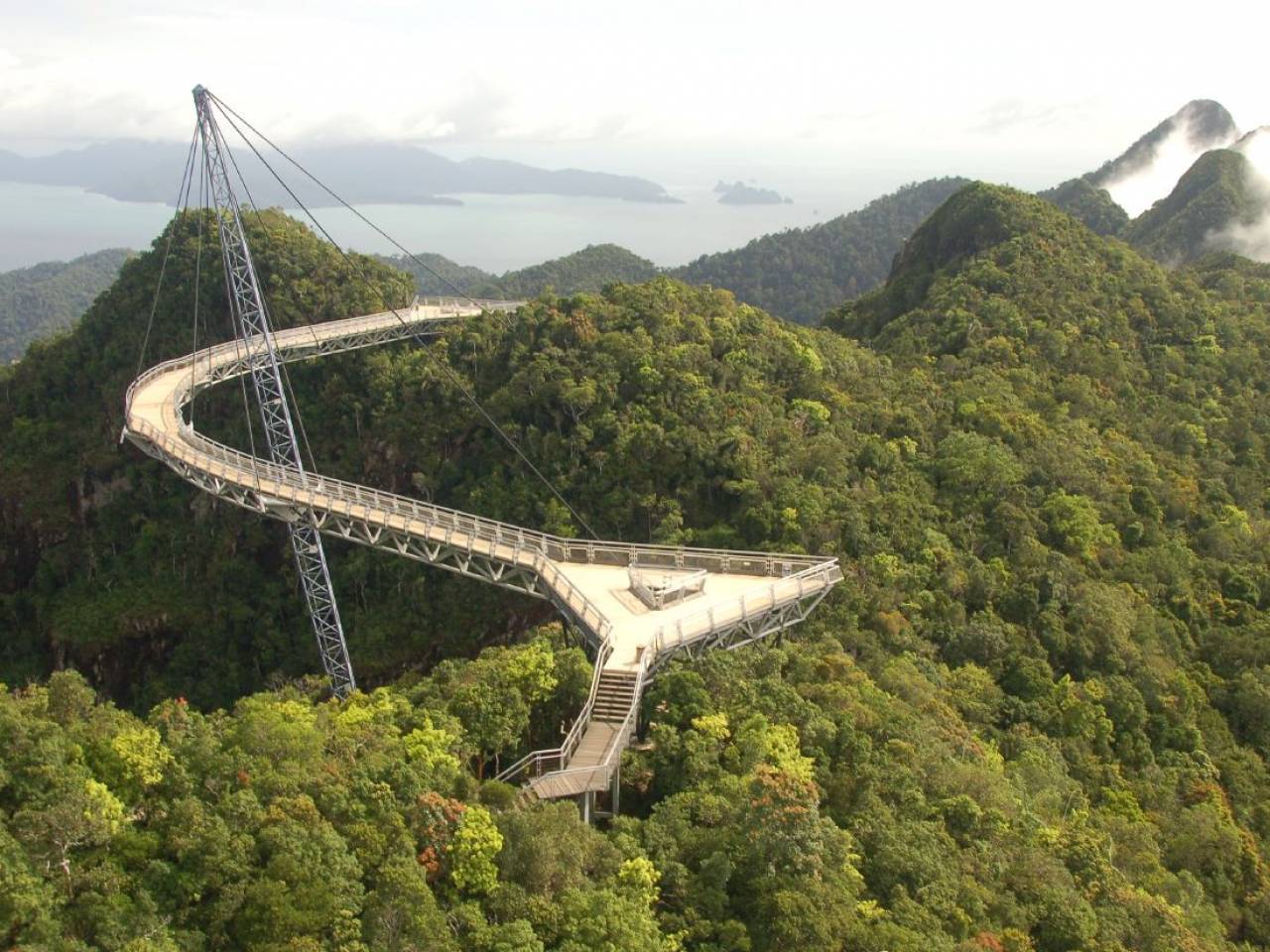 Dylan Walters / Flickr
Dylan Walters / Flickr
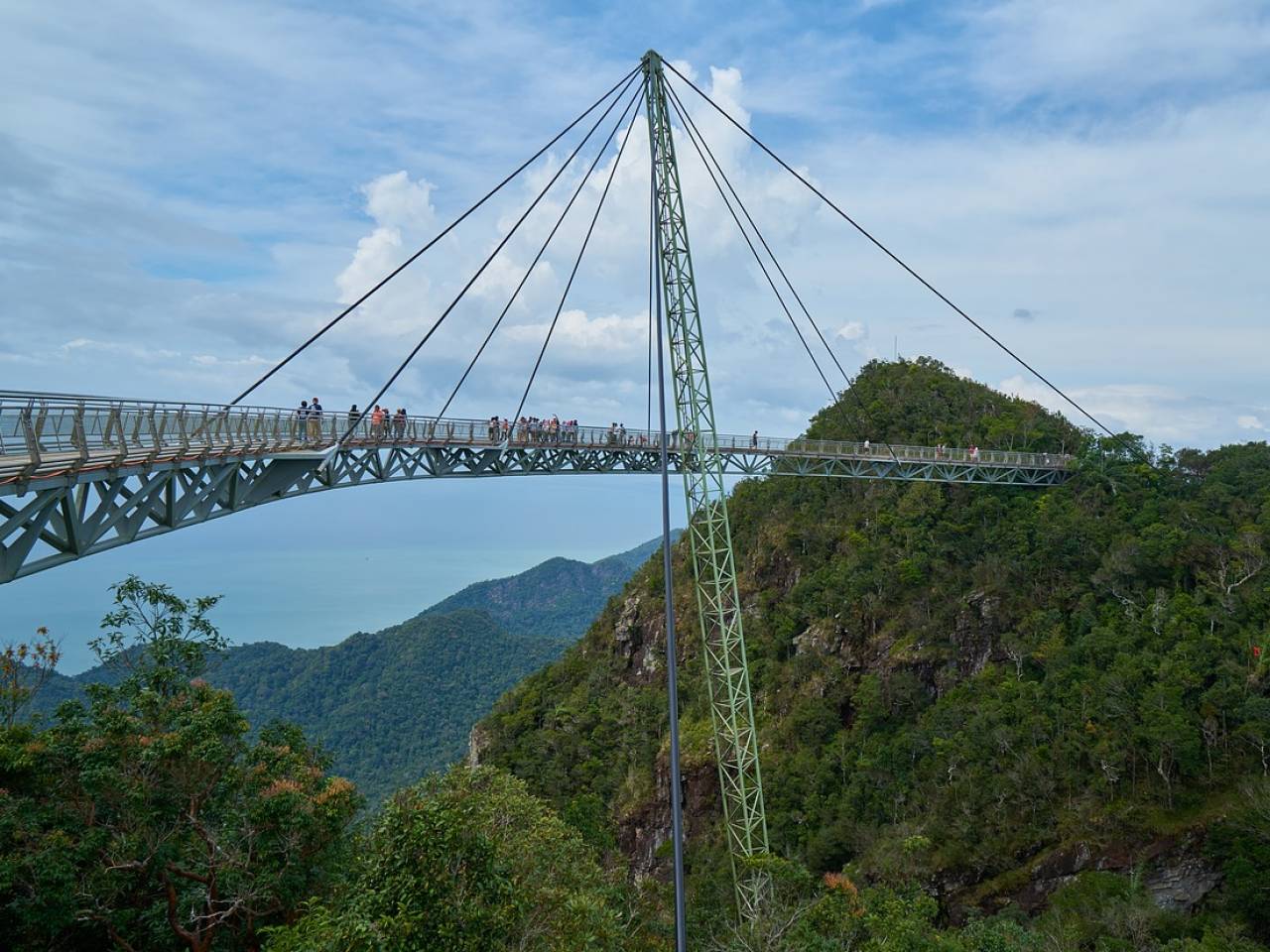 Engin_Akyurt / 10782 Bilder / Pixabay
Engin_Akyurt / 10782 Bilder / Pixabay
This steel skybridge that lets tourists stroll among the skies winds around forested mountain peaks and stretches 2,000 feet above sea level.
The 400-foot-long bridge is located at the peak of Gunung Mat Chinchang mountain in Malaysia and was constructed in 2005. Helicopters were needed to lift the bridge’s pieces to the top of the mountain in order to build it. It closed in 2012 for repairs, but was reopened in 2015.
Visitors must hike to the summit before taking the cable cars to reach the foot of the bridge. It’s worth it for the gorgeous views of the Andaman sea and its islands.
5. Titlis Cliff Walk, Switzerland
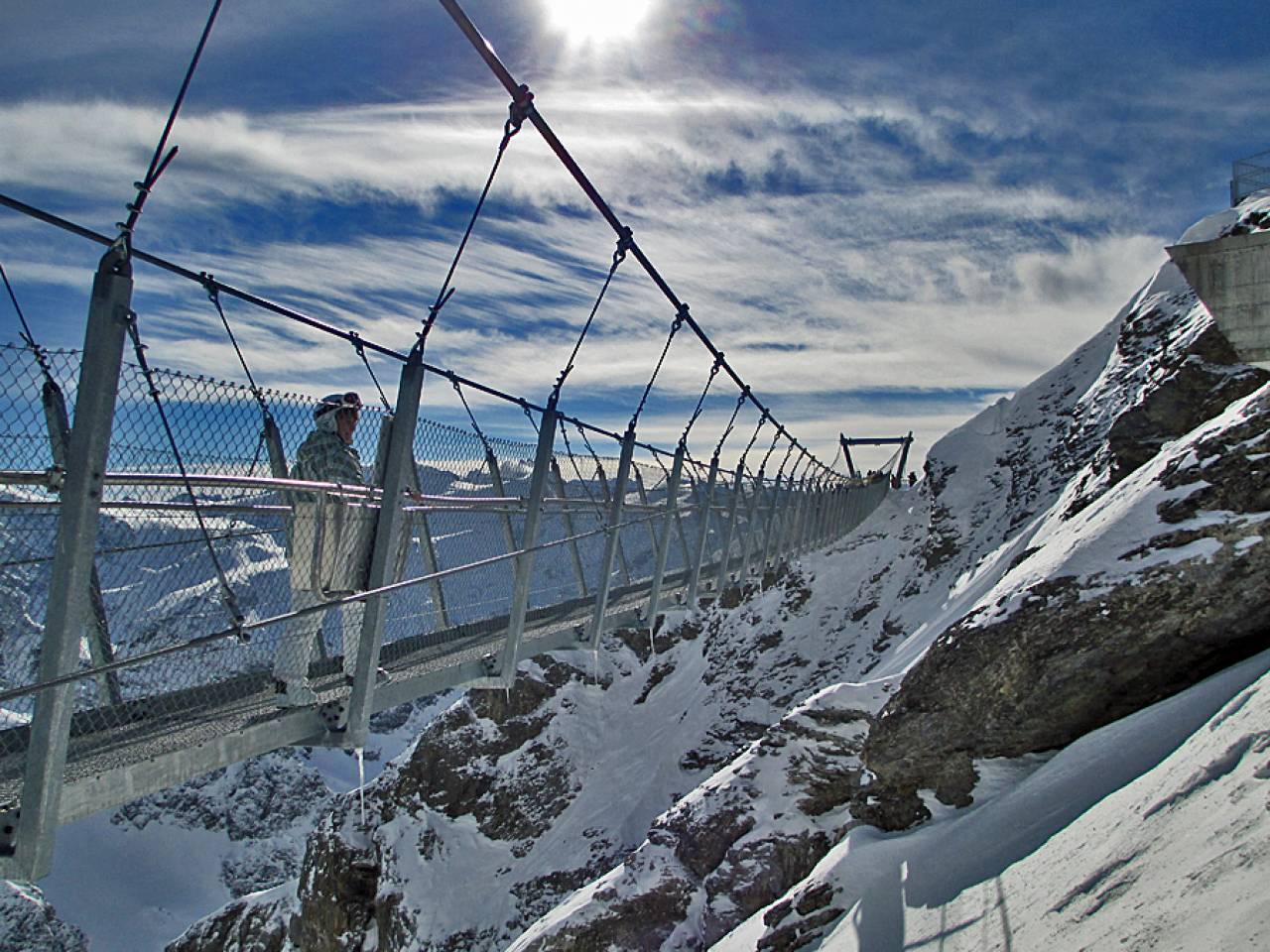 Andreas Faessler / Wikimedia Commons
Andreas Faessler / Wikimedia Commons
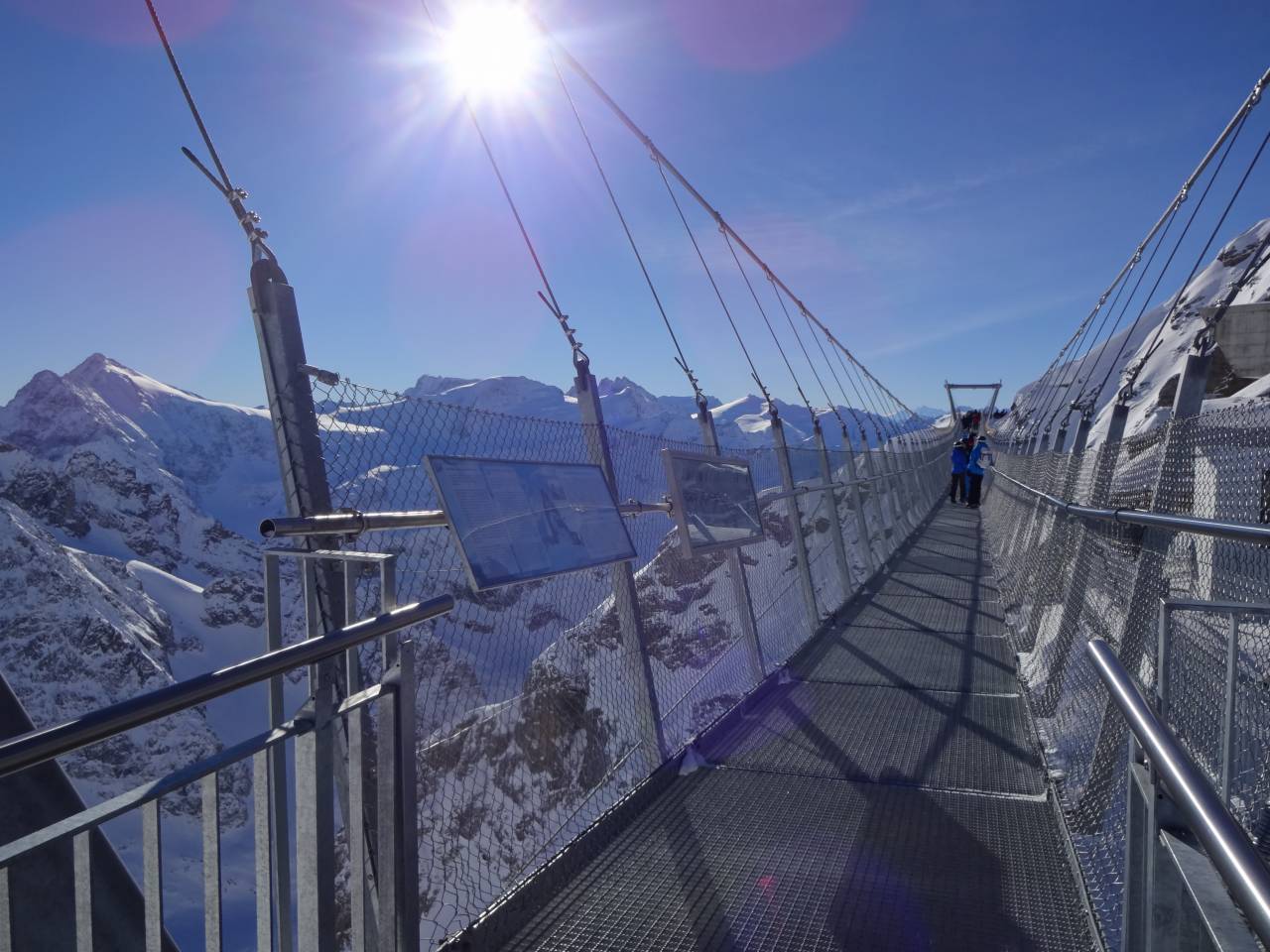 Andreas Faessler / Wikimedia Commons
Andreas Faessler / Wikimedia Commons
Grab your coats (and your courage) before heading to the Swiss Alps to promenade down this suspension bridge that’s poised 1,500 feet above a glacier and 9,000 feet above sea level.
This 330-foot bridge cost $1.6 million and took over five months to build before it officially opened to the public in 2012 — during a snowstorm that reduced visibility to just a few feet.
It was constructed to celebrate the 100th anniversary of the opening of a cableway which joined the towns of Engelberg and Gerschnialp, according to Fox News. It is believed to be the highest suspension bridge in Europe.
6. Zhangjiajie Glass Bridge, China
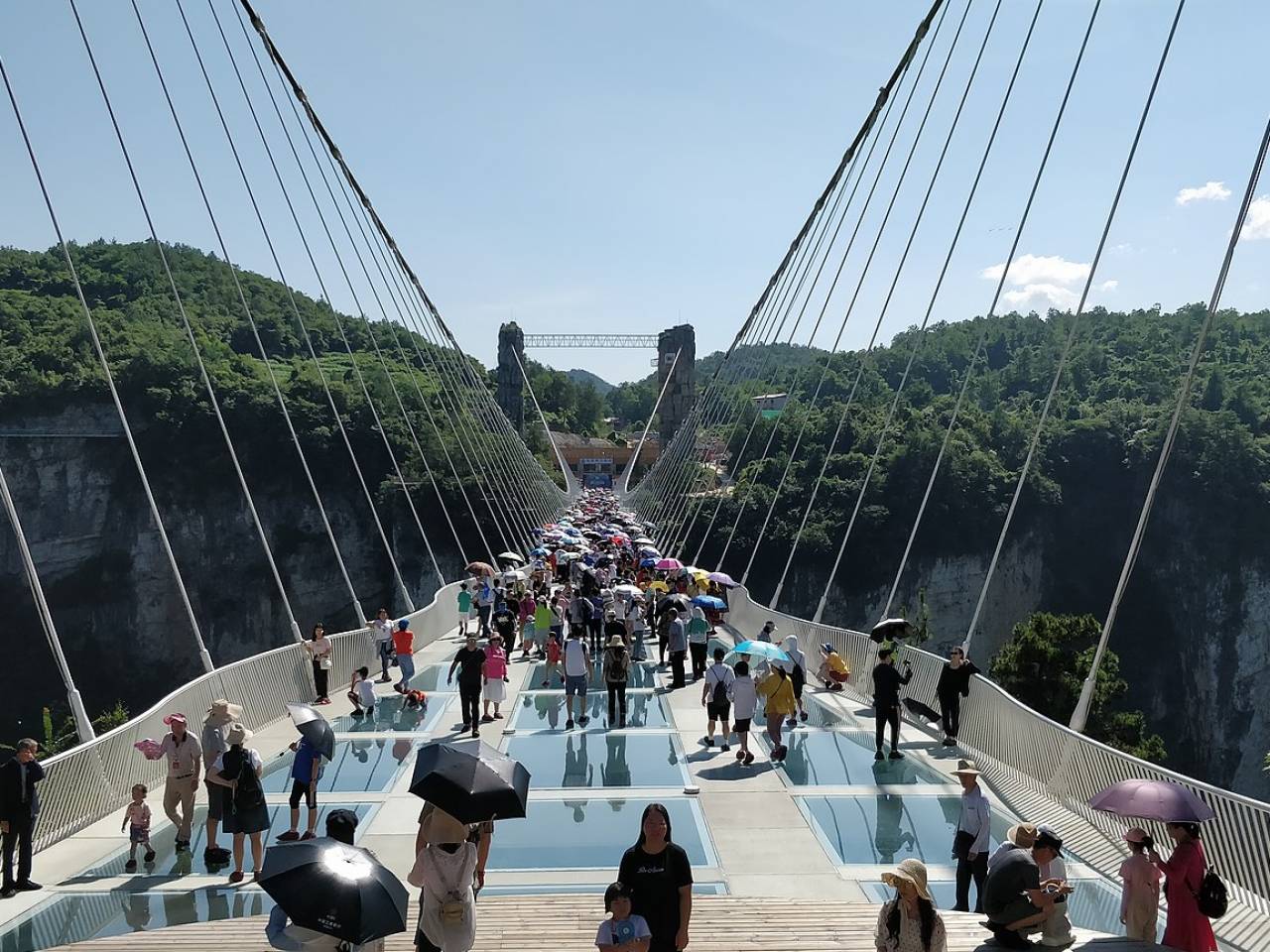 Sunyiming / Wikimedia Commons
Sunyiming / Wikimedia Commons
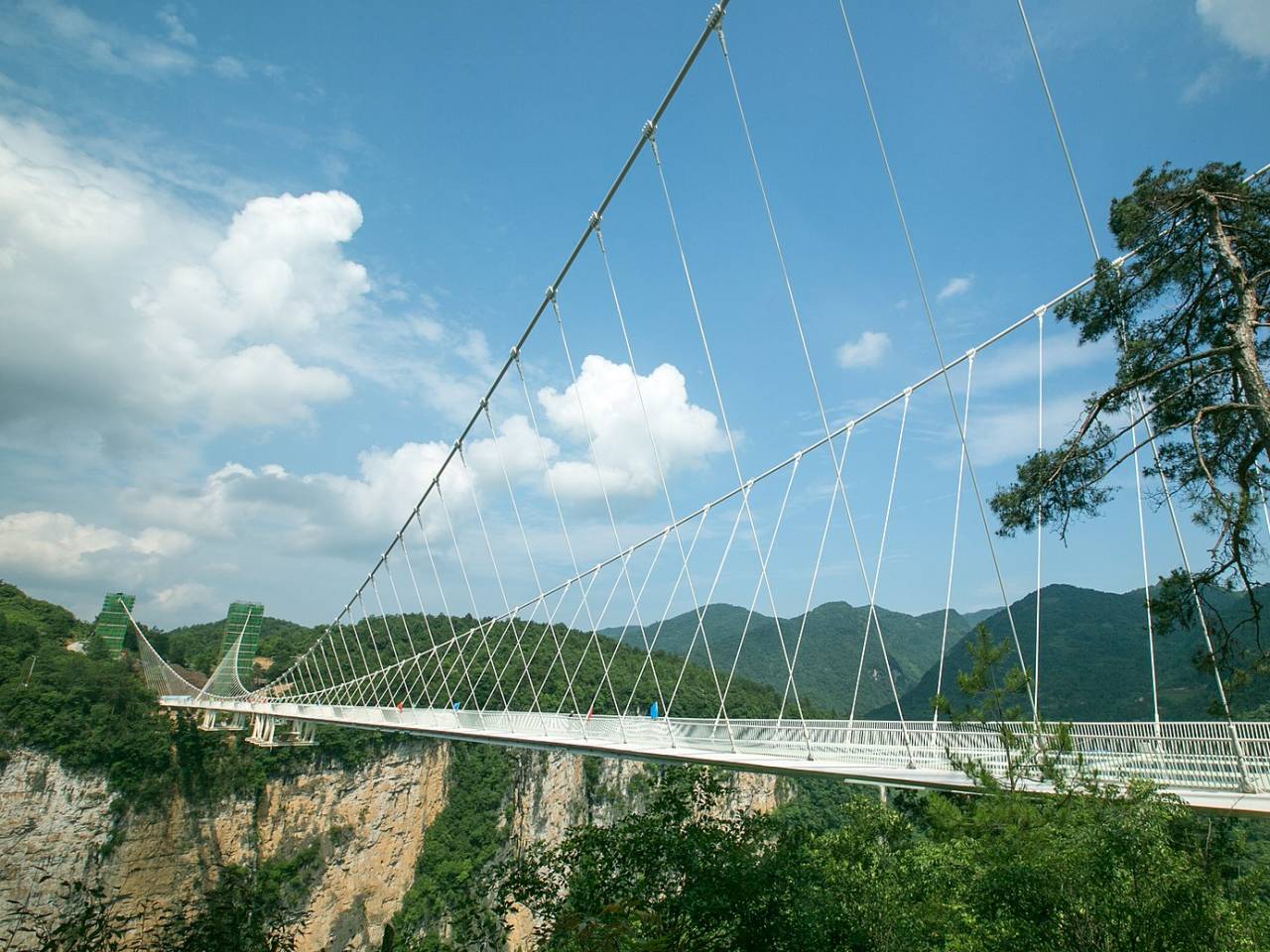 אביהוד / Wikimedia Commons
אביהוד / Wikimedia Commons
What’s more terrifying than a bridge that was built 1,000 feet off the ground? Try one with glass panels that allow you to see the ground directly under your feet.
BBC News reported in 2019 that there are around 2,300 glass bridges in China, and the Zhangjiajie Glass Bridge in Hunan, which was touted as the highest and longest glass-bottomed bridge when it opened in 2016, may have begun all the hype.
A similar bridge at Piyan Mountain in Longjing City made headlines in May after strong winds shifted and shattered the glass panes and left one tourist clinging to the edge before he was rescued by police, firefighters and forestry personnel.
7. Hussaini Hanging Bridge, Pakistan
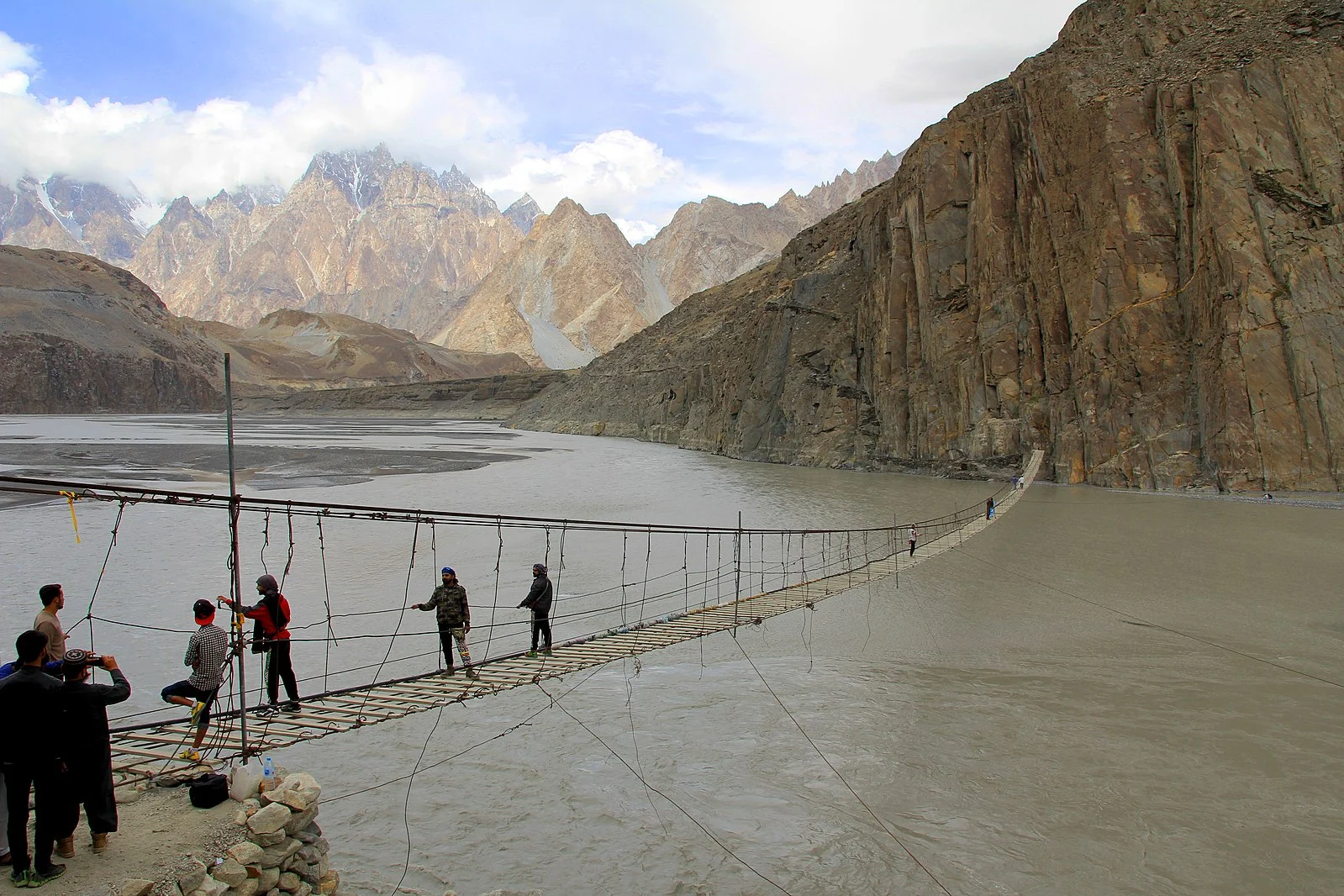 M.Ahmad Hussnain / Wikimedia Commons
M.Ahmad Hussnain / Wikimedia Commons
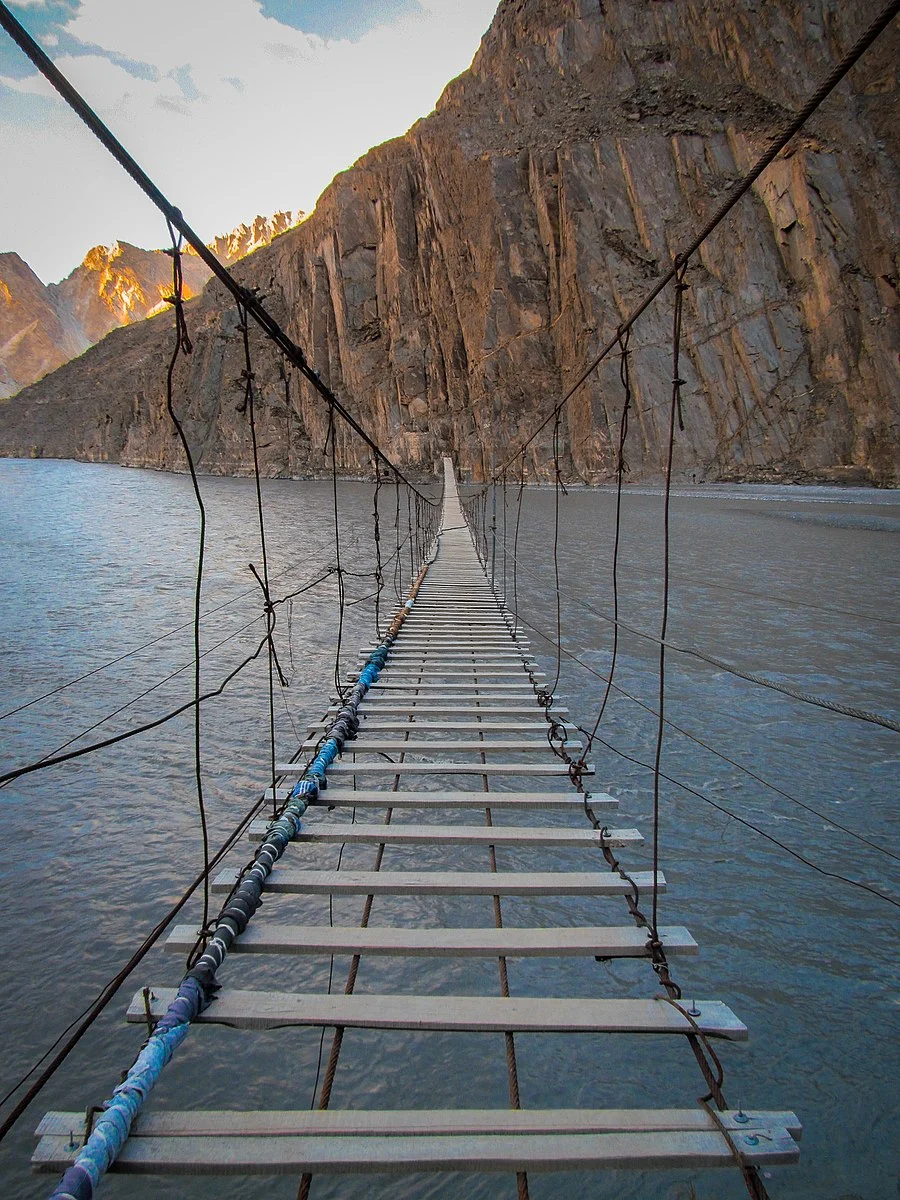 Taseer Beyg / Wikimedia Commons
Taseer Beyg / Wikimedia Commons
This precarious bridge made up of thin ropes and old planks in northern Pakistan’s Hunza region is considered one of the most dangerous bridges in the world.
Until 1979, when the Karakoram Highway was completed, locals in the Gilgit-Baltistan region were mostly barred from the rest of Pakistan. Rickety plank bridges, such as the Hussaini Hanging Bridge, provided access to more of the country.
Strong winds and missing planks can make the river crossing rather treacherous. Travel site Atlas Obscura reports that it may have even been washed away at some point by a 2011 monsoon storm.
8. Seven Mile Bridge, Florida
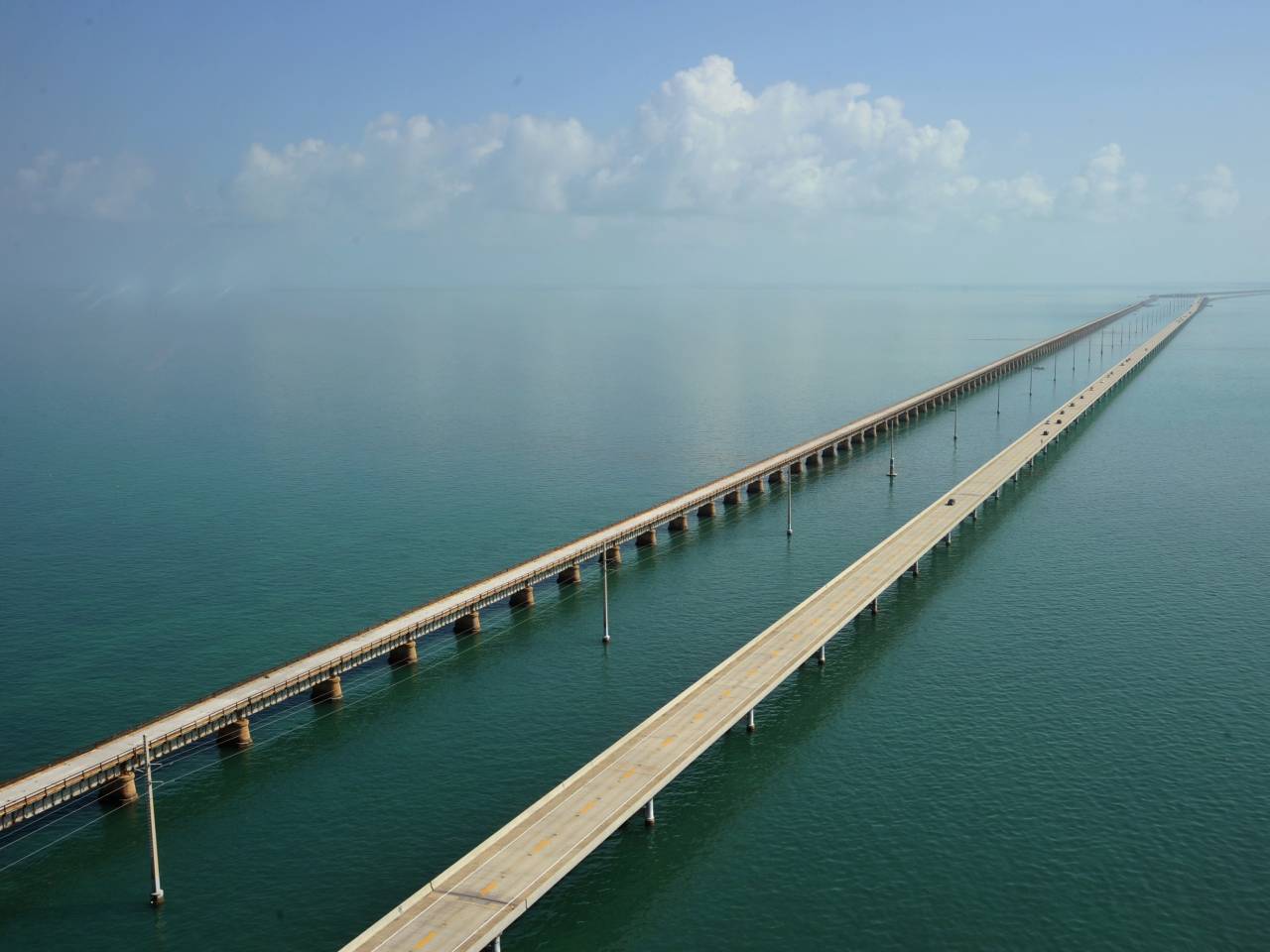 Meyyappan S / Flickr
Meyyappan S / Flickr
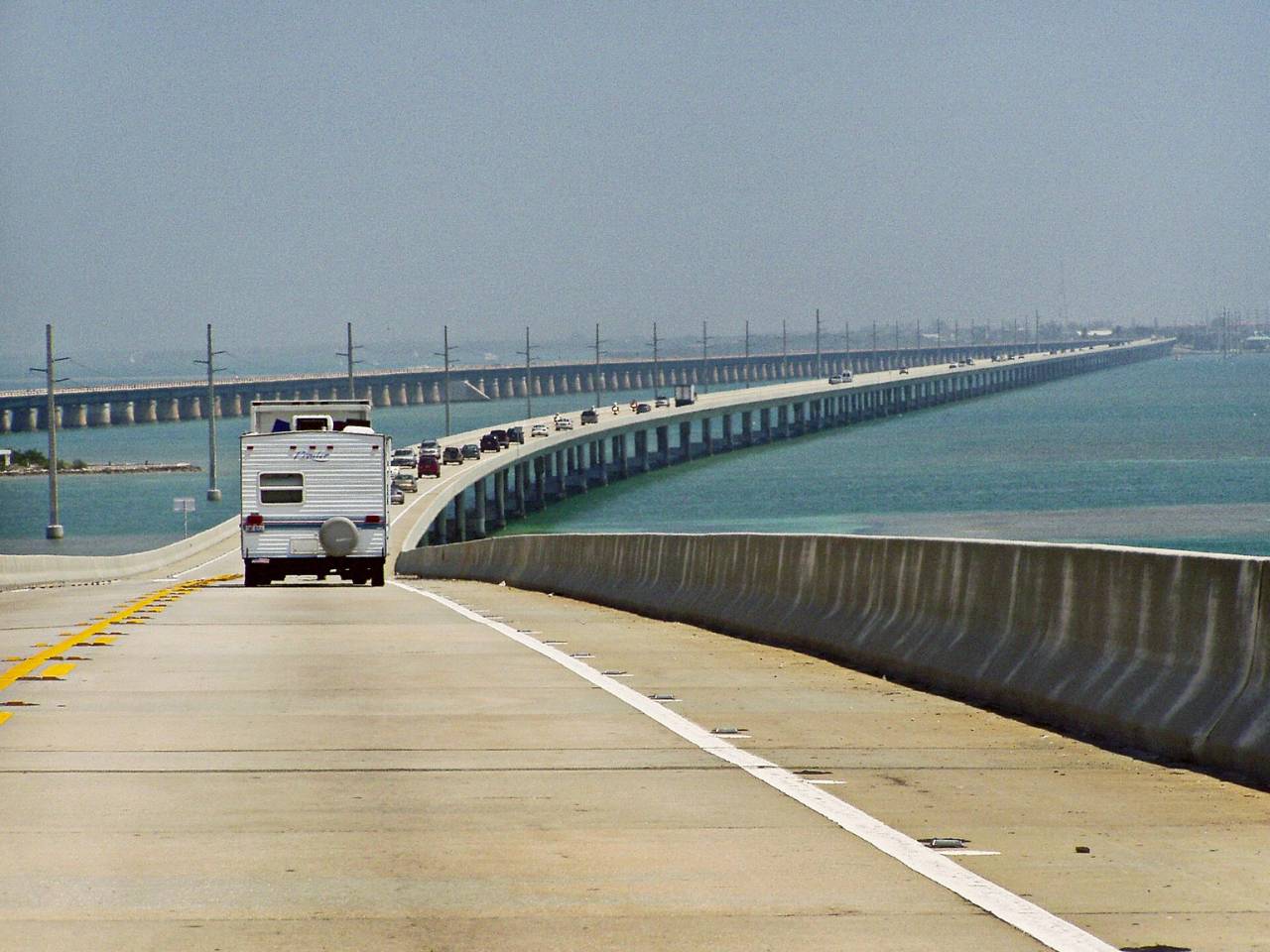 Matrek / Wikimedia Commons
Matrek / Wikimedia Commons
It says it all in the name. The longest bridge in the Florida Keys stretches over bright blue seas and connects Knight’s Key in Marathon to Little Duck Key in the Lower Keys.
The two-lane causeway was constructed from 1978 to 1982 and is quite sturdy, although you wouldn’t want to risk the drive in the middle of a hurricane or storm. You can spot the original bridge alongside it, which was built in 1912 as a railroad bridge.
You might also recognize the Seven Mile Bridge from its appearances in action flicks like 2 Fast 2 Furious and Mission Impossible III.
9. Chesapeake Bay Bridge, Maryland
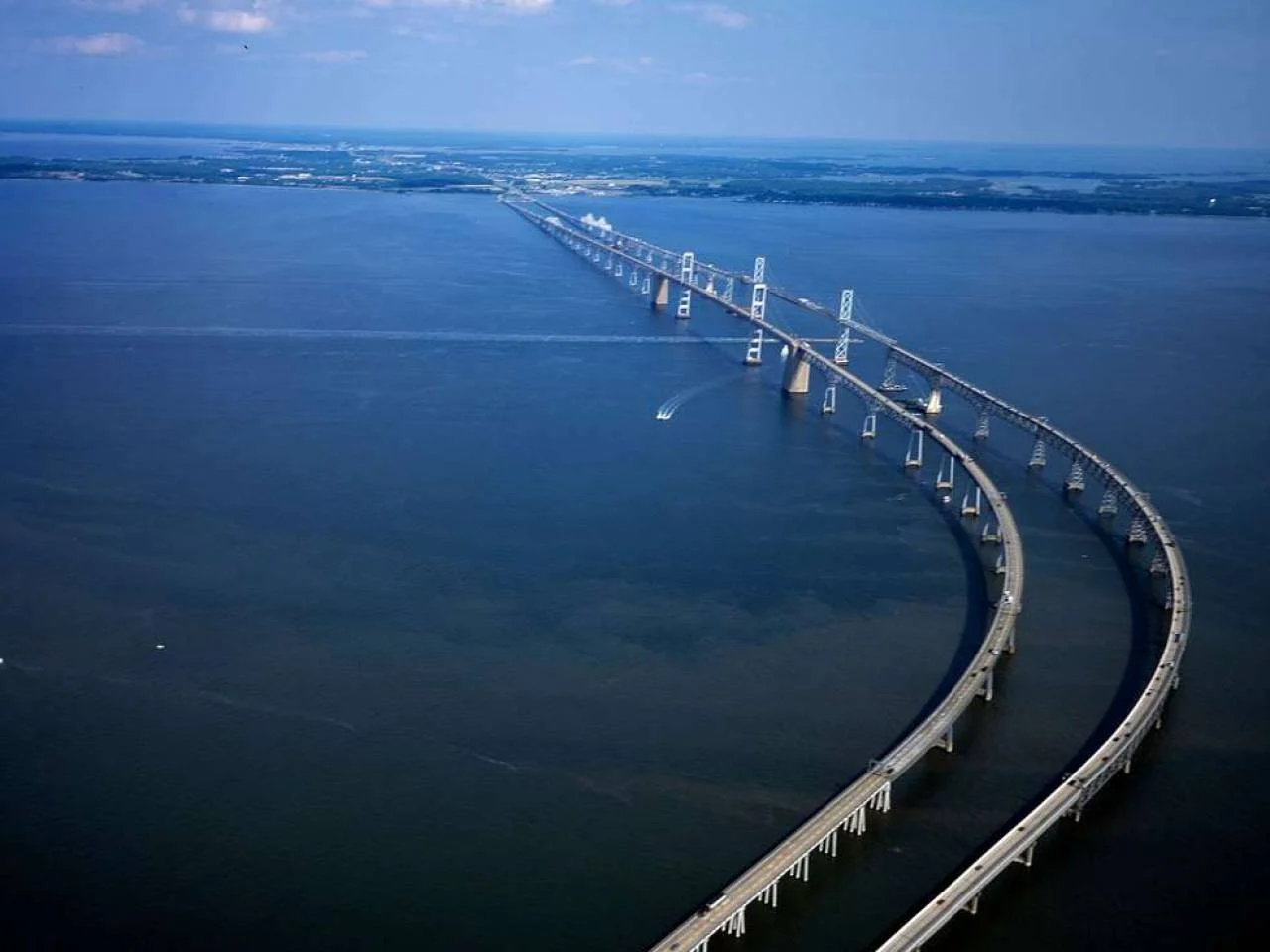 Carol M. Highsmith / Library of Congress
Carol M. Highsmith / Library of Congress
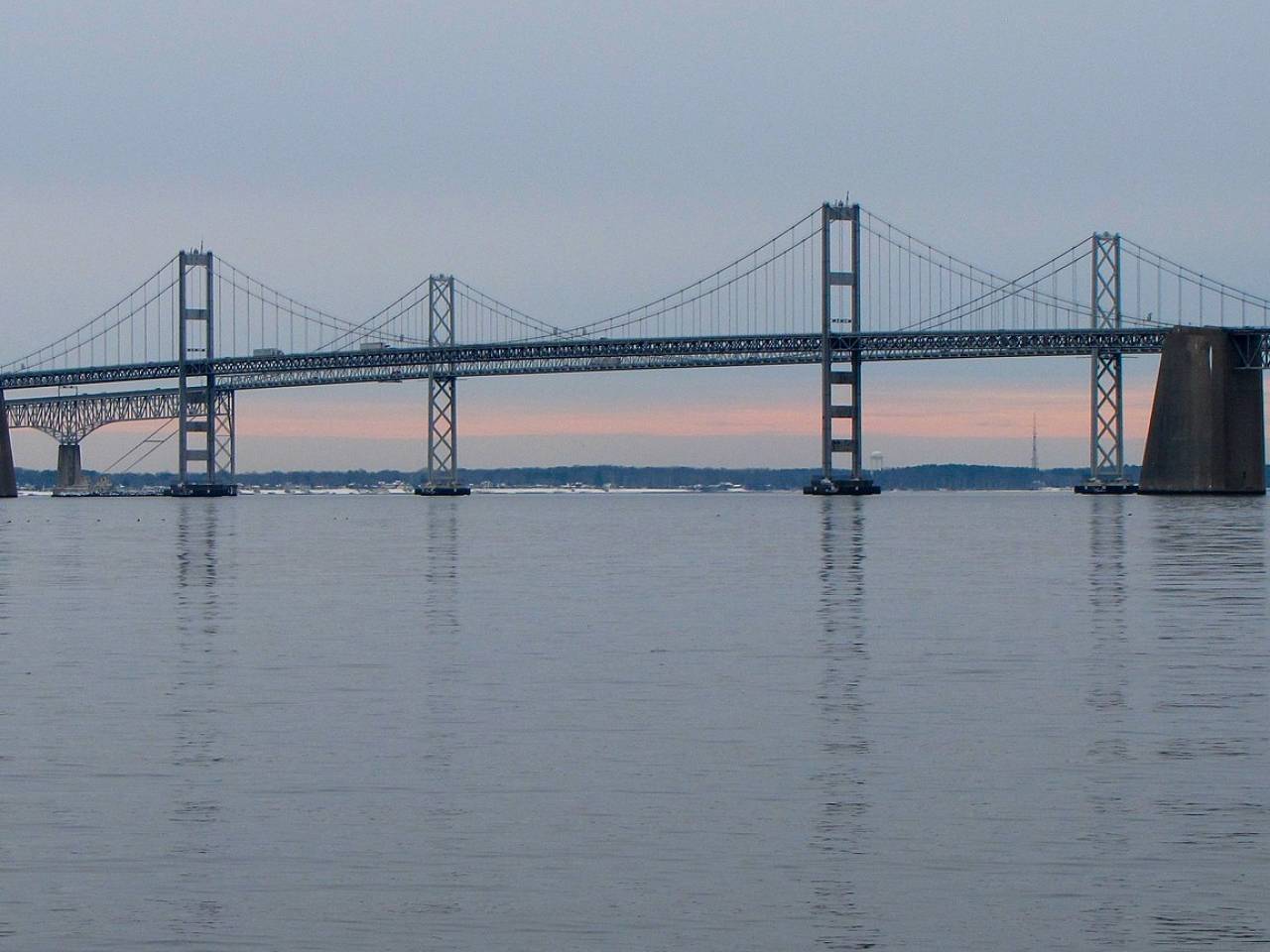 Ben Schumin / Wikimedia Commons
Ben Schumin / Wikimedia Commons
Visitors are willing to fork over $25 to get someone else to drive them across this bridge — one of America’s scariest due to its height above the water and low railings that give you a clear view of Chesapeake Bay on either side.
Some drivers have even experienced panic attacks while attempting to make the four-mile crossing on their own.
At its tallest point, the bridge stands 186 feet tall and there’s almost no room for a spooked motorist to pull over to the side.
10. Trift Bridge, Switzerland
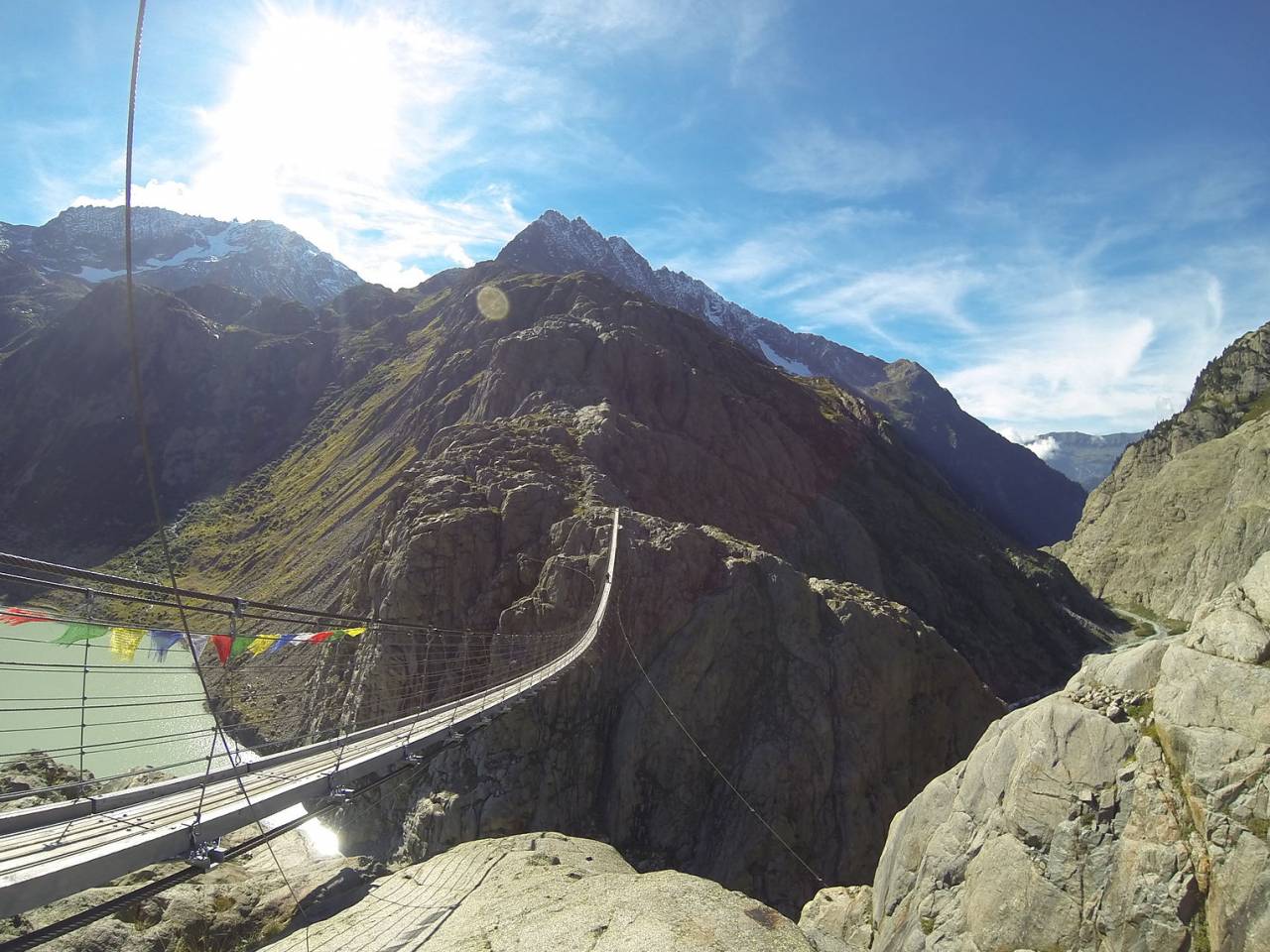 Laurian Gridinoc / Wikimedia Commons
Laurian Gridinoc / Wikimedia Commons
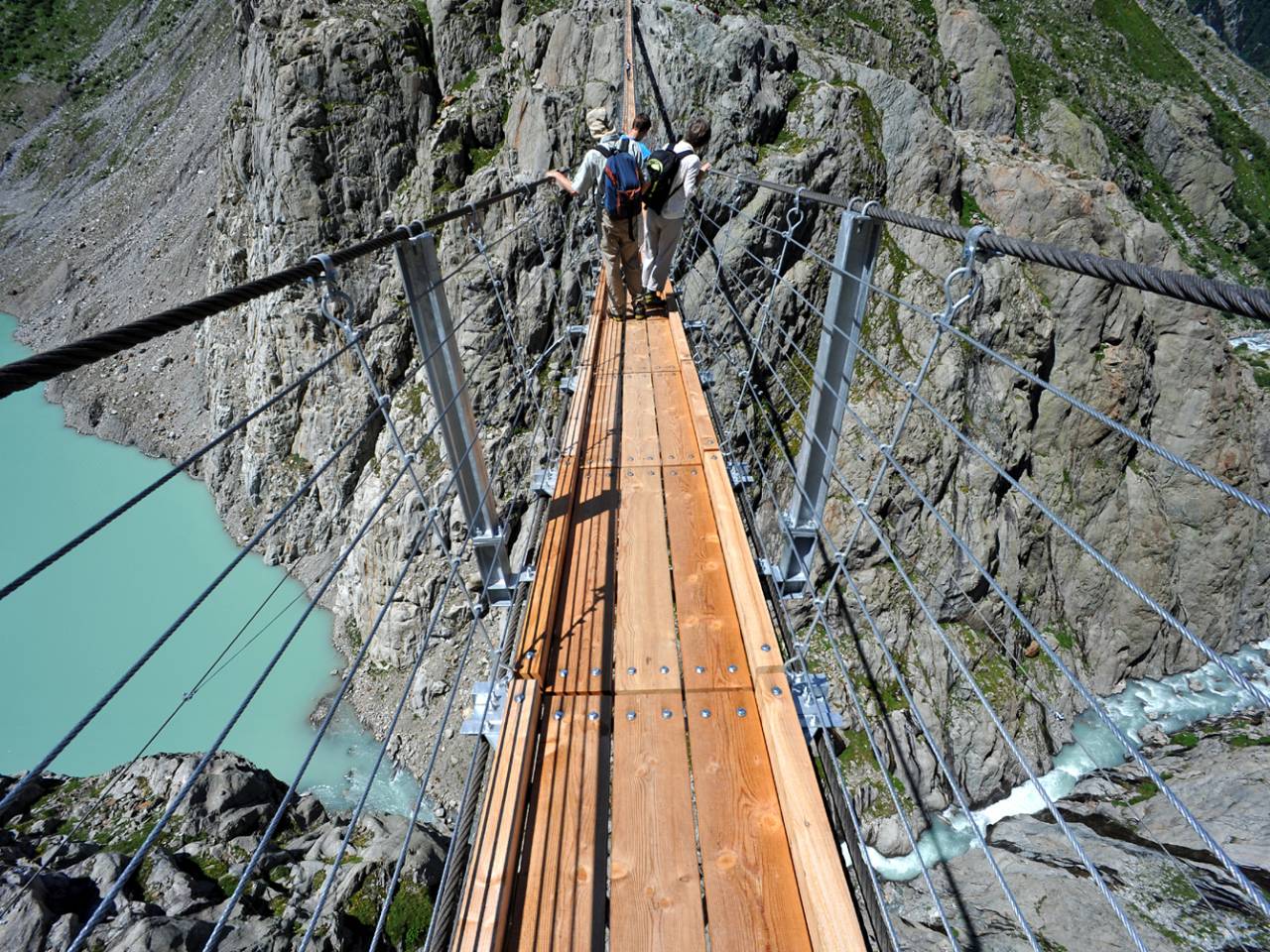 Хрюша / Wikimedia Commons
Хрюша / Wikimedia Commons
This modern footbridge suspended among the Swiss Alps over the Triftsee Lake, near Gadmen, Switzerland, spans over 550 feet and stands 328 feet tall.
It’s modelled after Nepalese high wire bridges and made out of thick steel cables and bolted wooden planks.
Trift Bridge was first built in 2004 before being replaced in 2009 with a sturdier model. It was then opened to the public. You’ll need to take a cable car trip to reach the site — a harrowing experience in and of itself due to the dizzying height.
11. Millau Viaduct Bridge, France
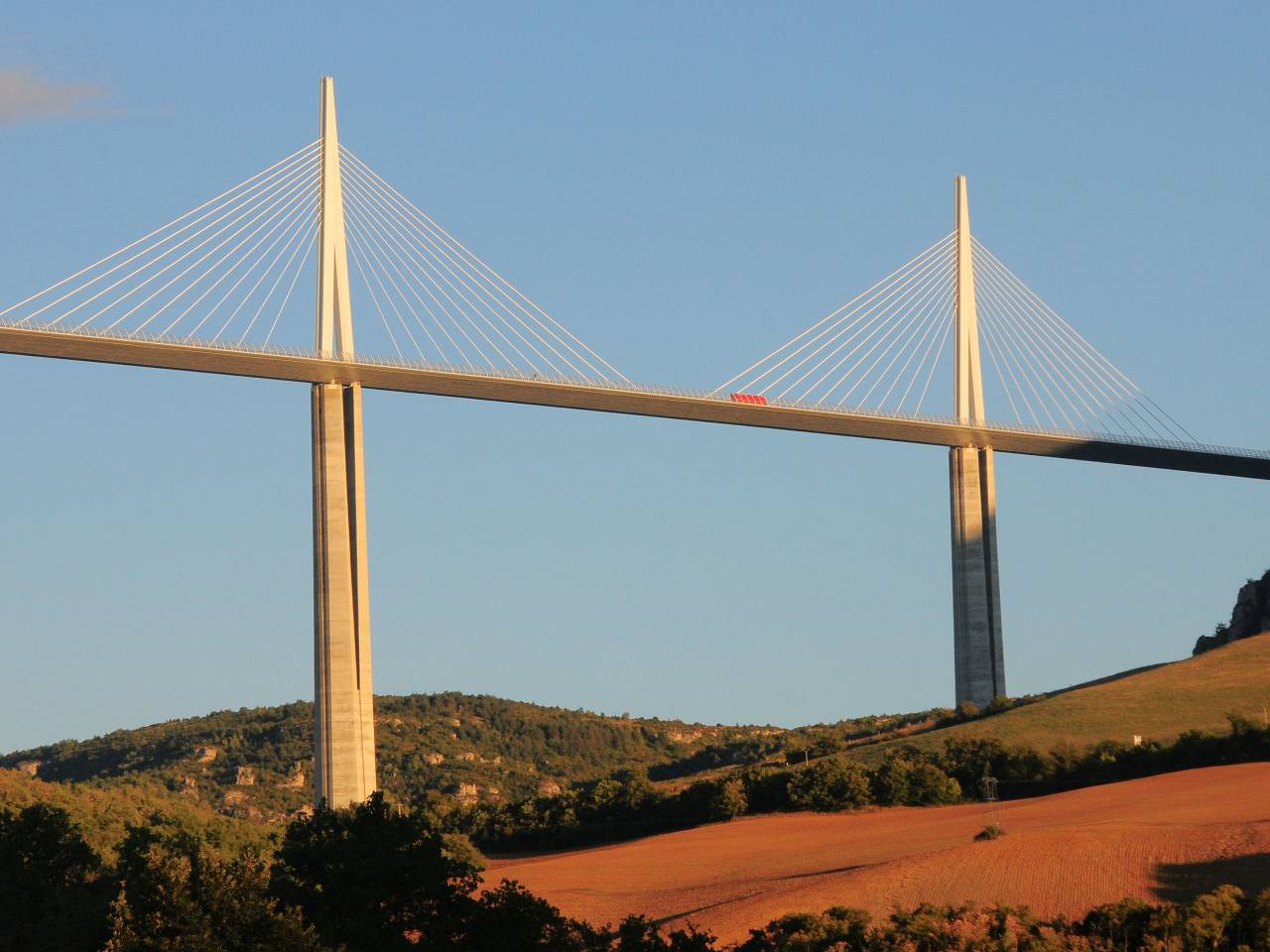 Mike McBey / Flickr
Mike McBey / Flickr
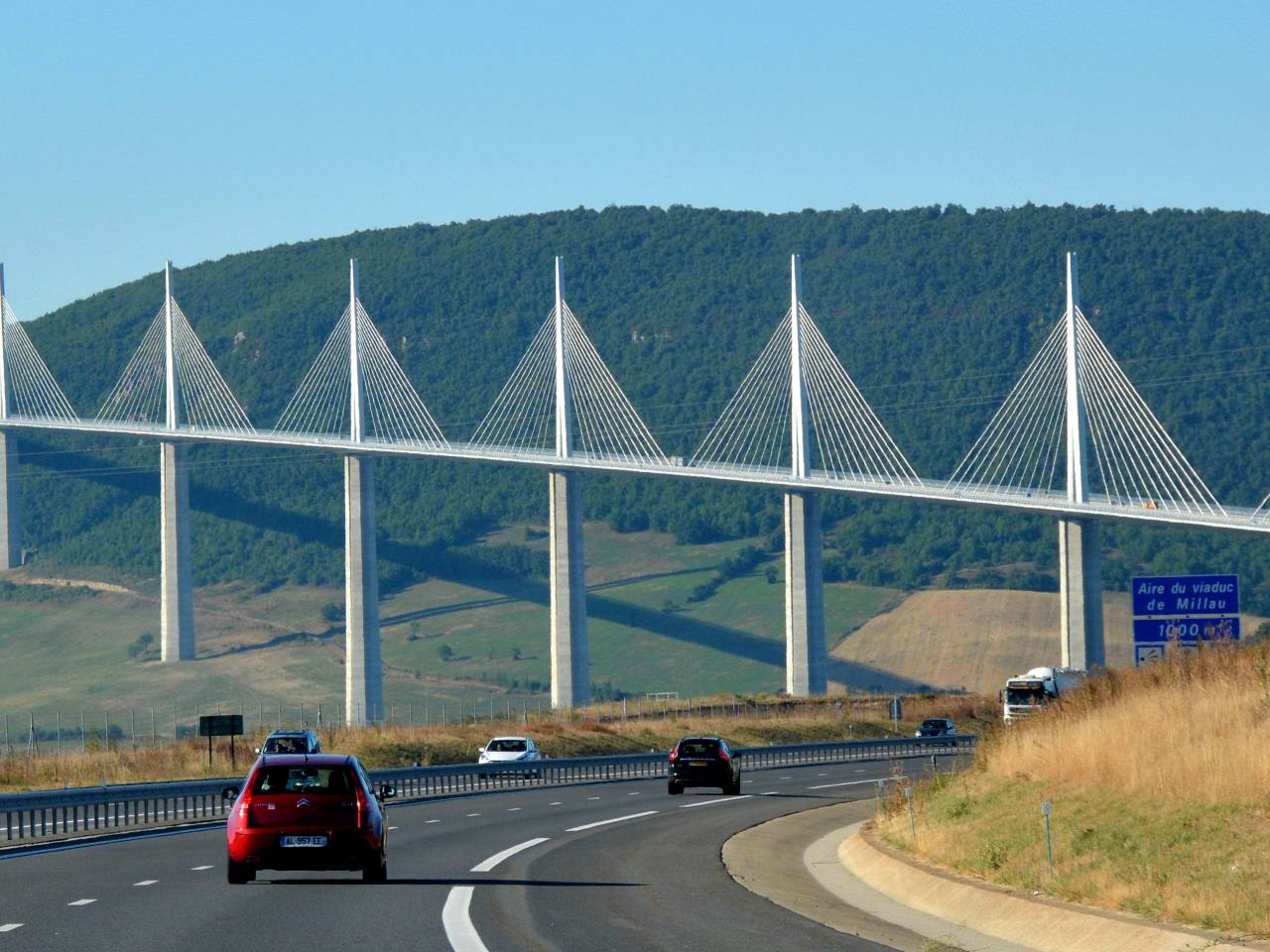 Mike McBey / Flickr
Mike McBey / Flickr
One of the world’s tallest bridges lies in southern France and it’s even bigger than the Eiffel Tower at its highest point.
The Millau Viaduct Bridge is perfectly safe for motorists, however. It’s reinforced by seven sturdy concrete piers, steel cable and pylons, and includes six lanes. Drivers can also stop to pull out their cameras and snap some photos of the stunning valley view.
The multi-span cable-stayed bridge began as a design contest to add another motorway to combat congestion between Spain and France in the Tarn valley, and was completed in 2004.
12. Iya Kazurabashi Bridge, Japan
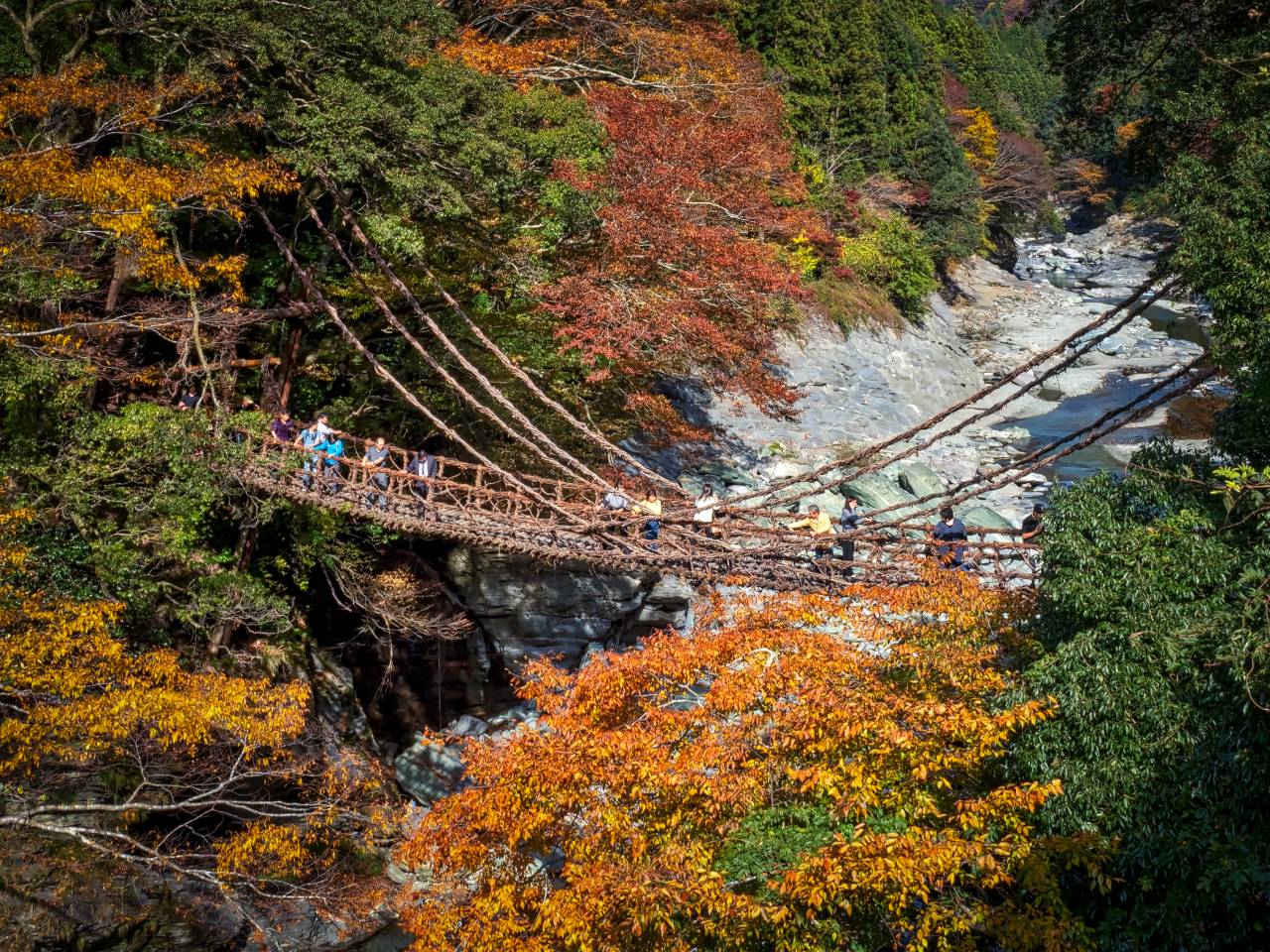 Dumphasizer / Flickr
Dumphasizer / Flickr
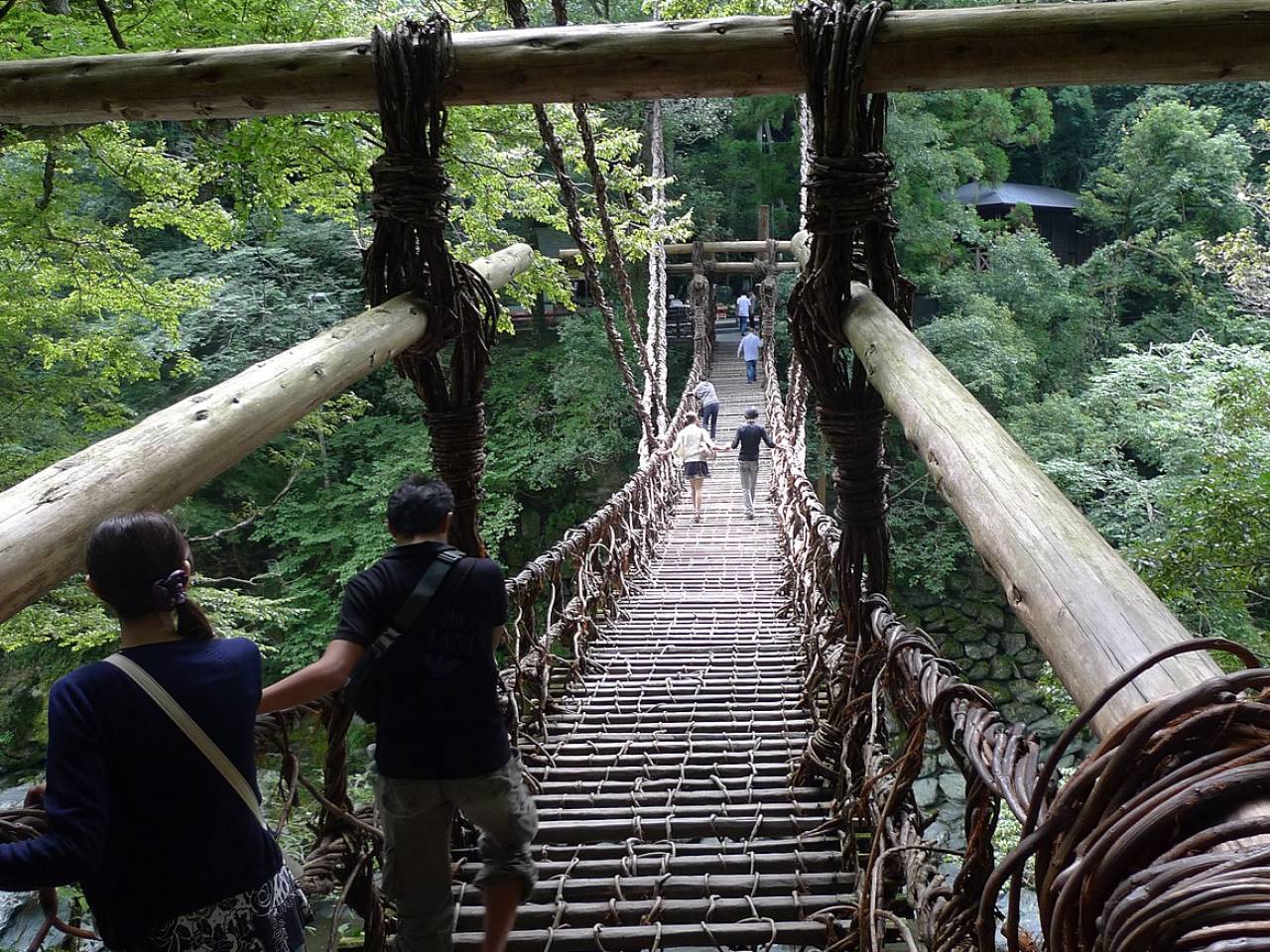 Motokoka / Wikimedia Commons
Motokoka / Wikimedia Commons
This handwoven vine bridge that hovers 46 feet over steep gorges in Tokushima's Iya Valley might make you nervous. It was originally created to provide passage to inhabitants of the area, but could be cut down in case of enemy invasion.
In modern day times, however, slicing away at the vines isn’t quite as easy. The bridge is reinforced with hidden steel cables and gets rebuilt every three years so that it’s safe for public access.
The 148-foot-long Iya Kazurabashi Bridge is just one out of three preserved vine bridges in the secluded, mountainous valley. You can also check out the husband-and-wife Oku-Iya Kazurabashi bridges near Mount Tsurugi.
13. Ojuela Bridge, Mexico
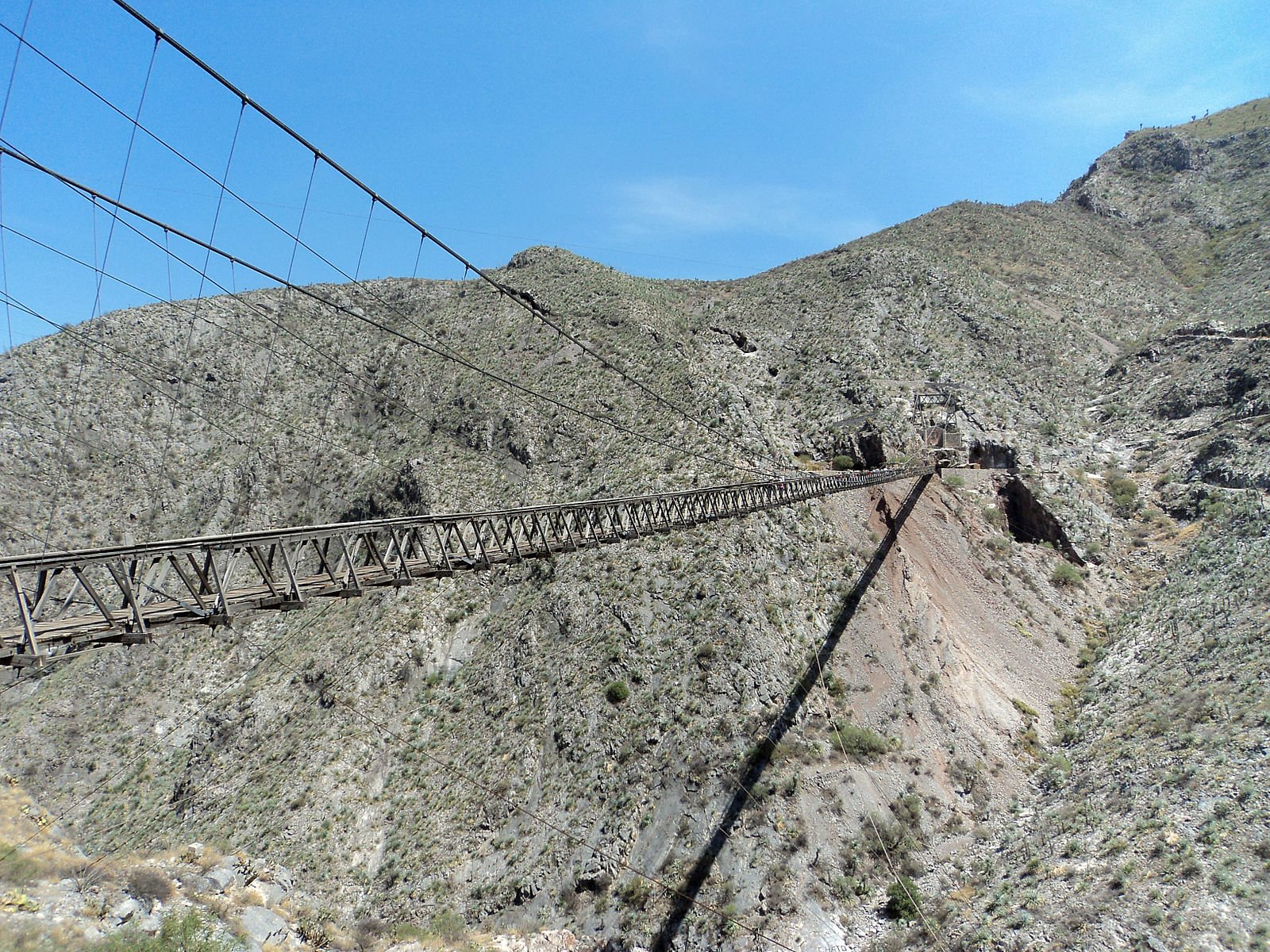 Isaac Salvador Pérez / Wikimedia Commons
Isaac Salvador Pérez / Wikimedia Commons
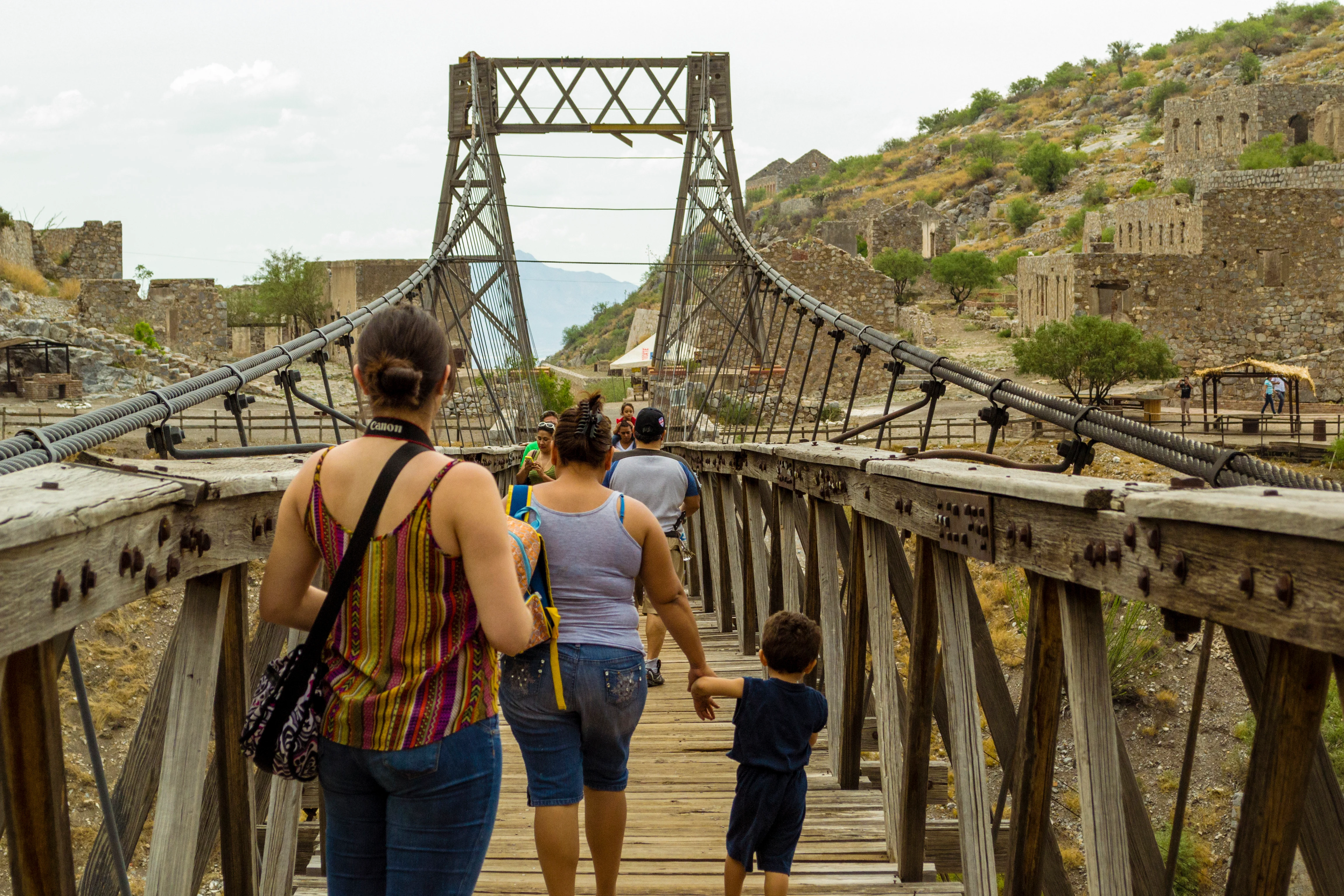 BlatZzz / Wikimedia Commons
BlatZzz / Wikimedia Commons
This 1,000-foot-long suspension bridge connects an abandoned mine to a ghost town amidst jagged cliffs and a deep ravine — it was built in 1898 before being restored as a tourist attraction in 1991.
Designed by the same team behind the Brooklyn Bridge, the Ojuela Bridge, or Mapimi Bridge, was allegedly constructed to aid in moving ore to the nearby village. It’s just 2 feet wide and strengthened with steel cables.
You’ll have to make the daunting 4-mile drive up a narrow mountain slope to reach the bridge.
14. Sidu River Bridge, China
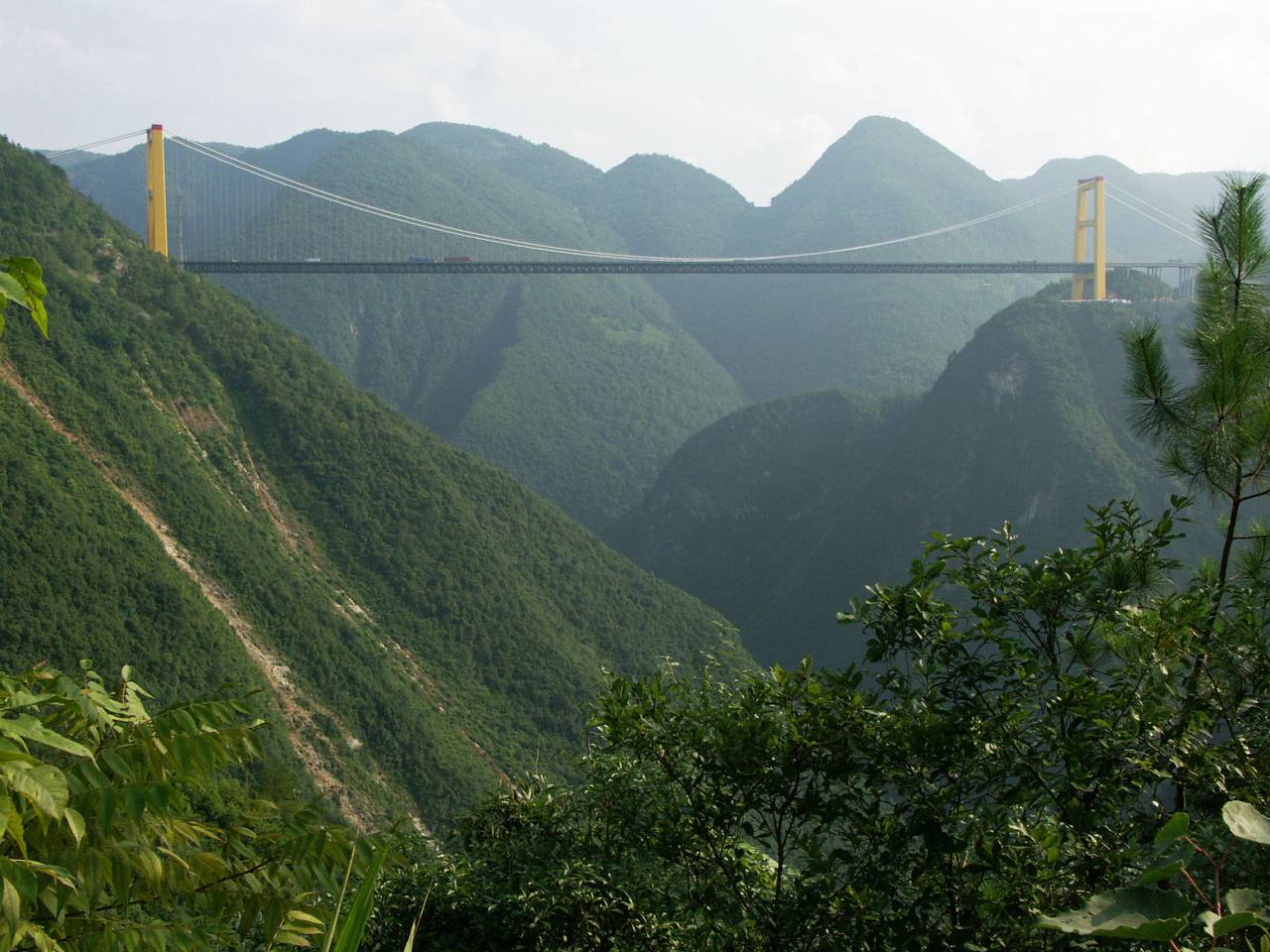 Eric Sakowski / Wikimedia Commons
Eric Sakowski / Wikimedia Commons
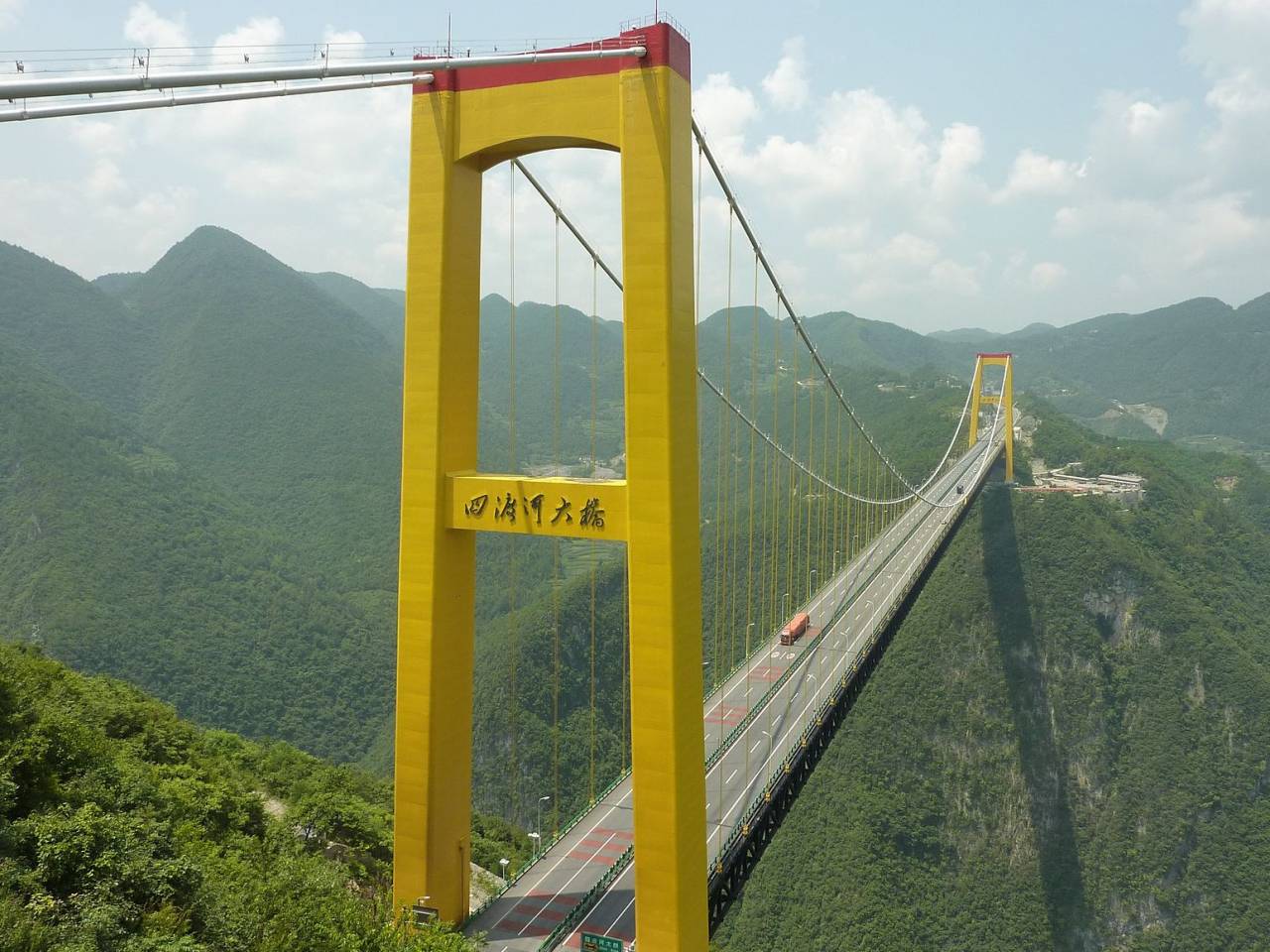 Glabb / Wikimedia Commons
Glabb / Wikimedia Commons
The Sidu River Bridge in China’s Hubei province stands a vertigo-inducing 1,600 feet above a canyon floor and connects two mountain peaks.
Builders had to use military rockets to launch cables across the gap, as it spans over 5,000 feet of valley terrain. VICE reports that this may have been the only time a rocket was used to transport pilot cables.
If you have a fear of heights, you might want to avoid the crossing, although it’s reportedly quite safe, supported by steel and concrete and two H-shaped towers at both ends.
15. Eshima Ohashi Bridge, Japan
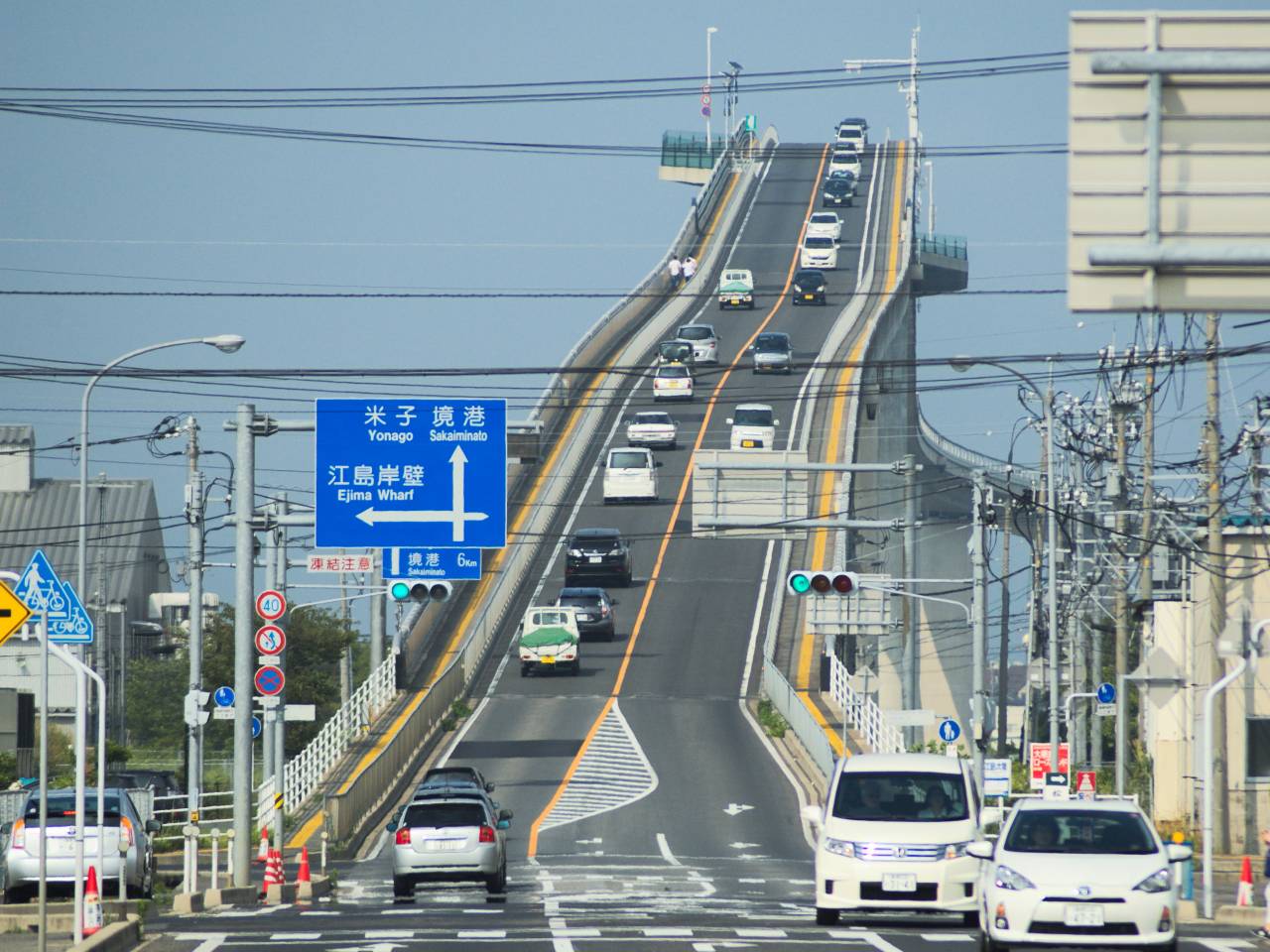 mstk east / Flickr
mstk east / Flickr
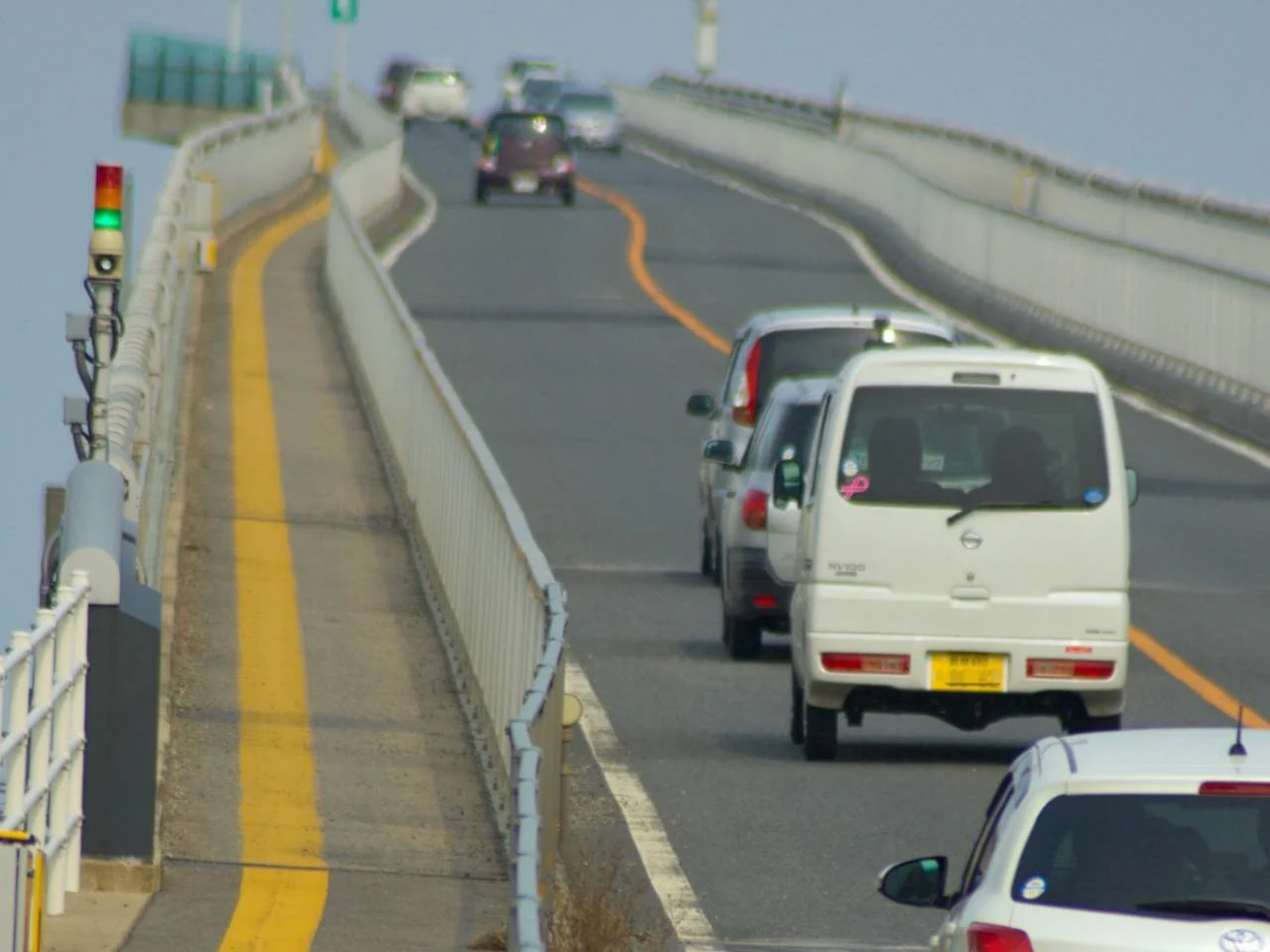 mstk east / Flickr
mstk east / Flickr
Japan’s “rollercoaster bridge” links the cities of Matsue and Sakaiminato with a steep slope and sudden drop-off that makes it appear as though the bridge leads straight into the skies.
The Eshima Ohashi Bridge bridge was constructed between 1997 to 2004 and is tall enough to allow ships to pass in between both inclines. It garnered attention in a TV commercial for car brand Daihatsu in 2015, which used an angle that apparently exaggerated the steepness of the slope.
The bridge is nearly a mile long and is considered the largest rigid frame bridge in Japan and the third largest in the world.
16. Q'eswachaka Bridge, Peru
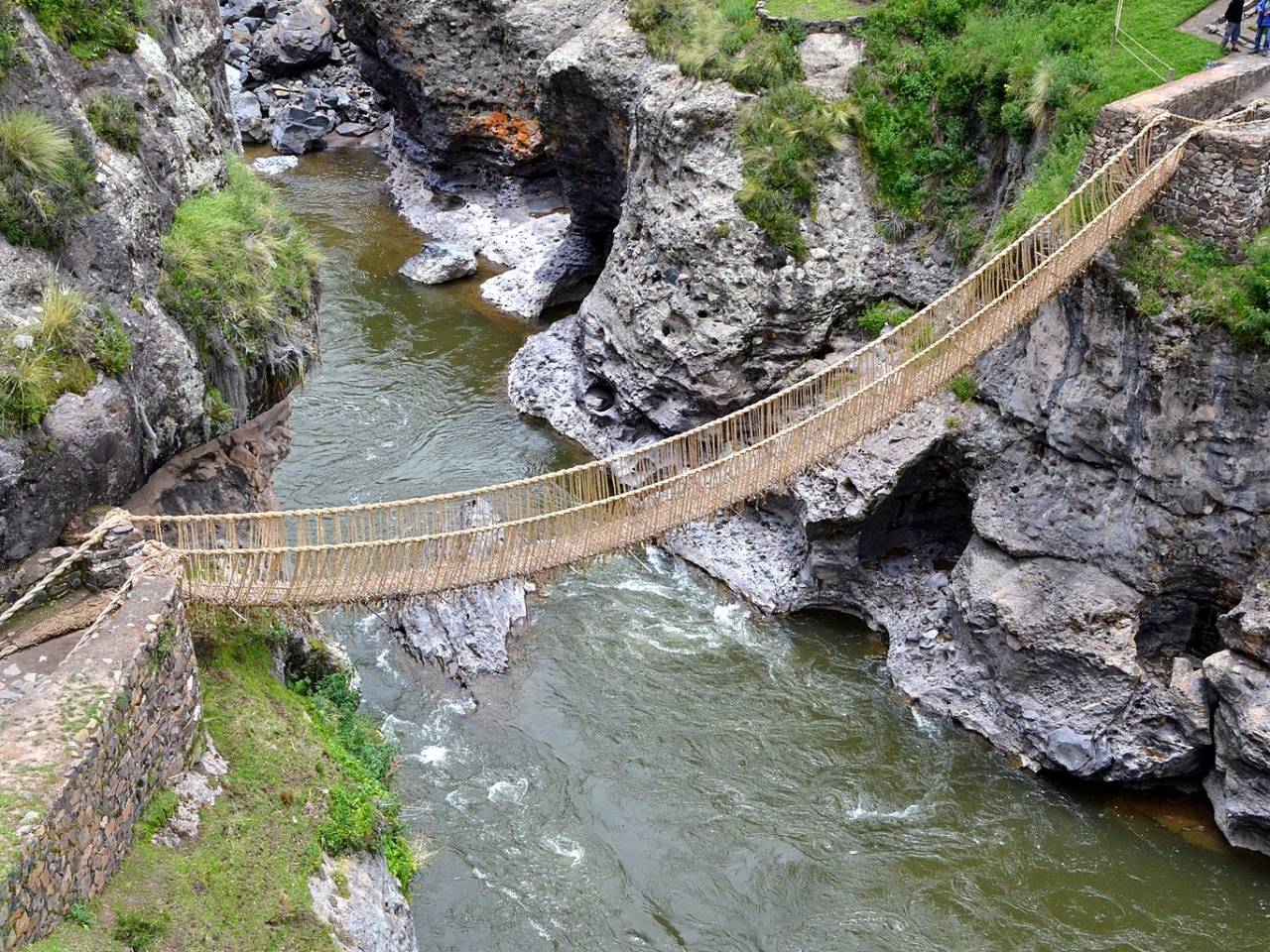 Aga Khan (IT) / Wikimedia Commons
Aga Khan (IT) / Wikimedia Commons
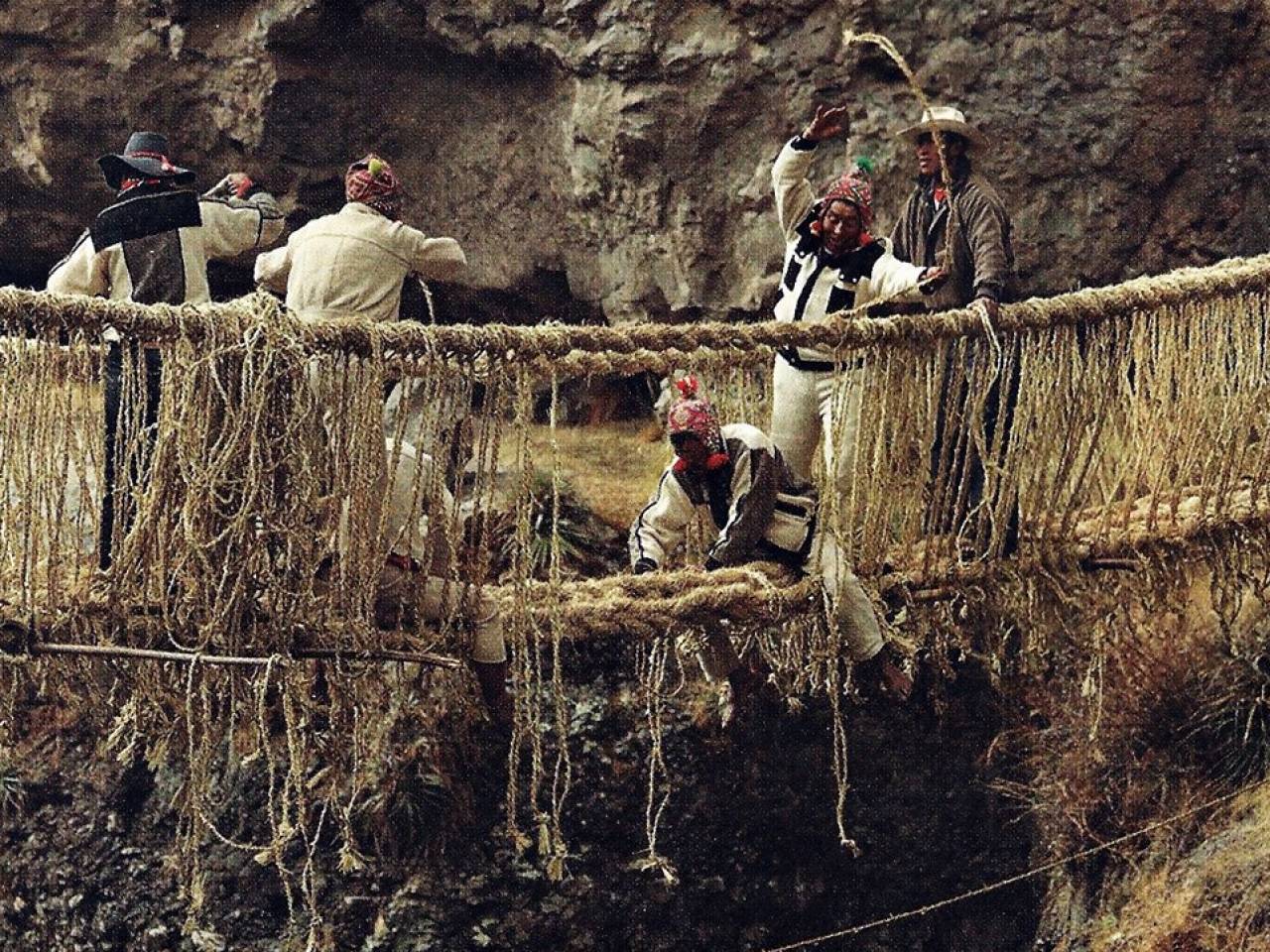 MI PERÚ / Flickr
MI PERÚ / Flickr
This 118-foot, handwoven grass bridge crosses the Apurimac Canyon in Peru.
Handwoven bridges were an integral part of the Incan road system for hundreds of years. The Incan women began by braiding the grass into thin ropes, which would then get woven together into sturdier cables by the men.
The bridge is destroyed and rebuilt by the Quechua communities in a ceremony each year so don’t worry about it fraying beneath your feet. “The main support of the bridge comes from six large three-ply ropes about one foot thick, each containing about 120 of the original thinner ropes,” writes BBC.
17. Hanging Bridge of Ghasa, Nepal
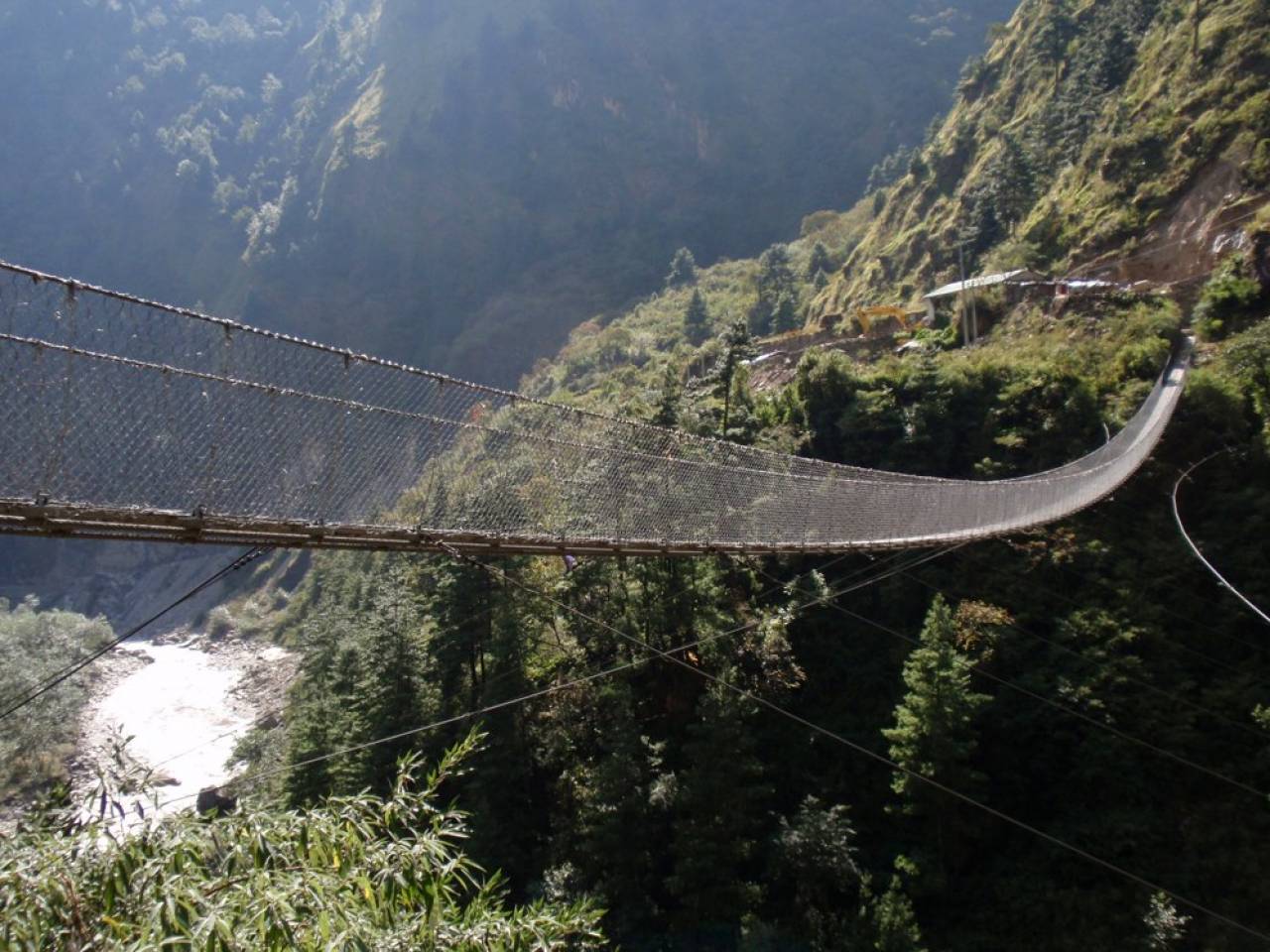 John Pavelka / Flickr
John Pavelka / Flickr
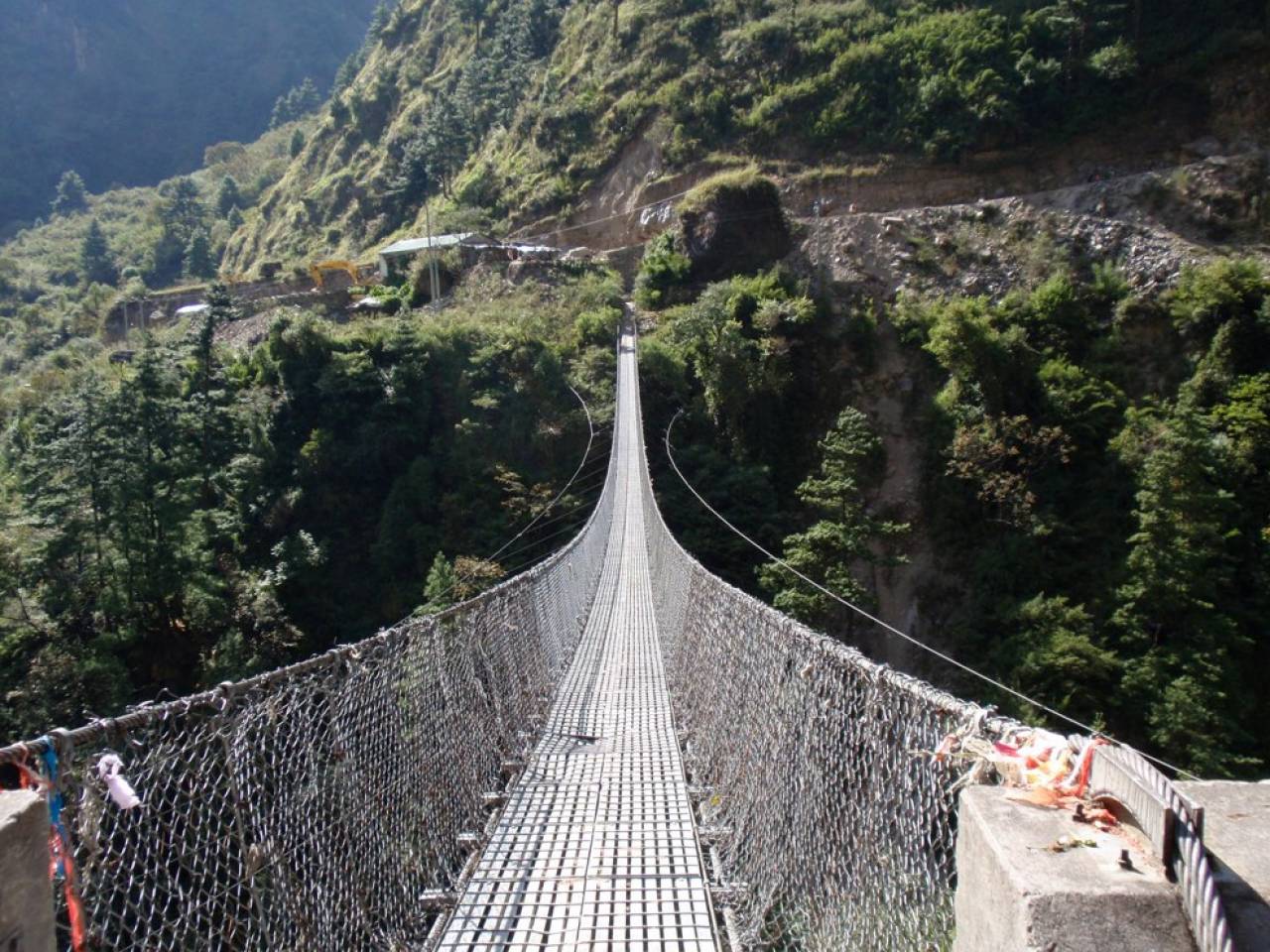 John Pavelka / Flickr
John Pavelka / Flickr
This hanging bridge near the Himalayas is used to transport both locals and cattle. In fact, the bridge is believed to have been built to reduce traffic congestion caused by animal herds.
Suspended over the Kali Gandaki River in Nepal, the narrow bridge is susceptible to strong gusts of wind and shepherds reportedly put blinders on animals to keep them calm.
18. Skybridge, Russia
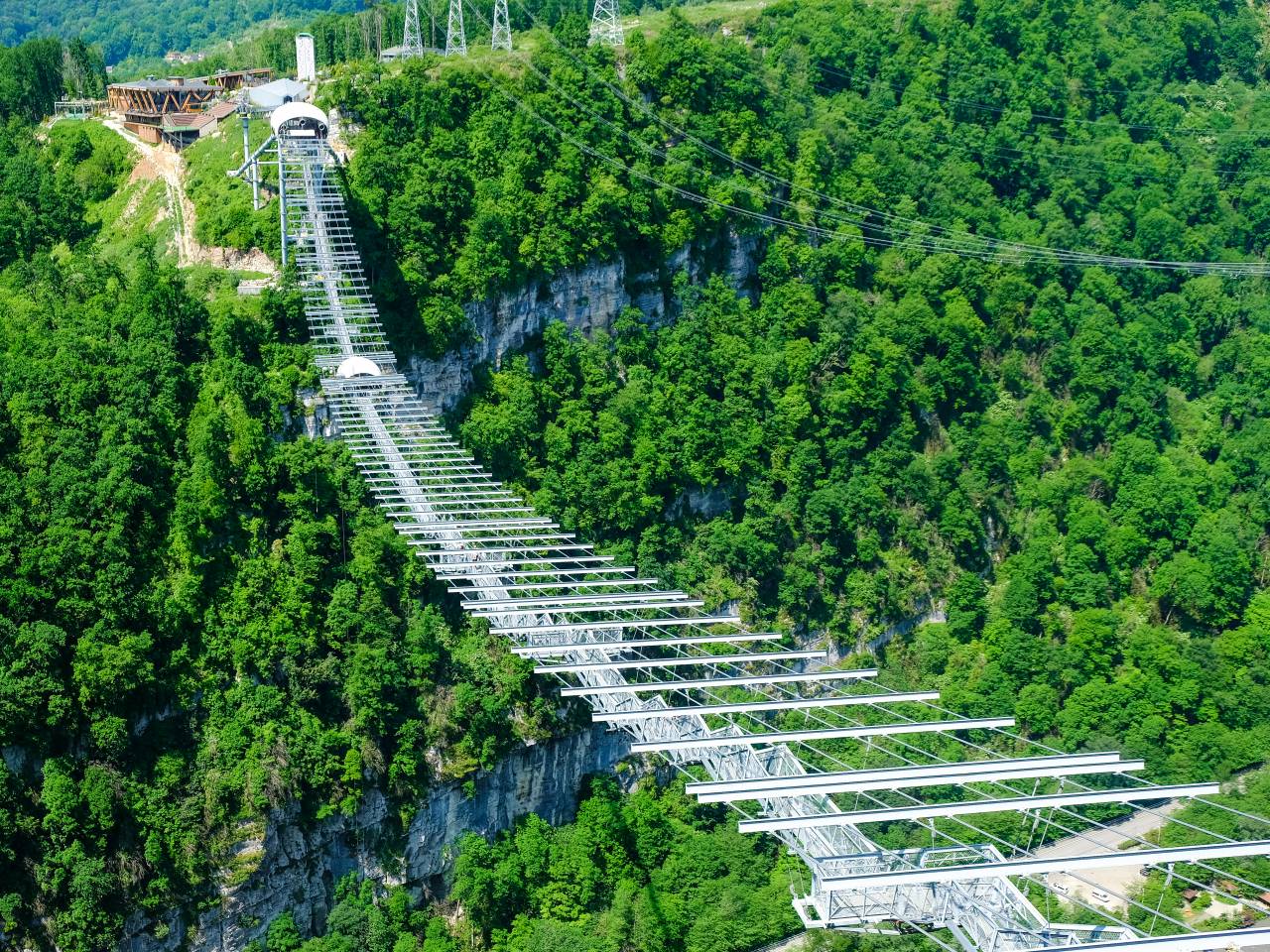 Igor Lushchay / Shutterstock.com
Igor Lushchay / Shutterstock.com
 Elena_Titova / Shutterstock.com
Elena_Titova / Shutterstock.com
The Skybridge near Sochi, Russia bills itself as the longest suspension footbridge in Russia, stretching over 1,400 feet across the Krasnaya Polyana valley. It is part of an adventure park called Skypark.
It’s actually quite safe to walk across and can hold up to 30,000 people at a time. “Skybridge exceeds the requirements of all the safety standards: it is able to withstand a Richter magnitude 9 earthquake, hurricane wind, rain, snow, and icing at the same time,” says the Skypark website.
And if you’re feeling particularly gutsy, you can try bungee jumping or ziplining at the park as well.
19. Carrick-a-Rede Rope Bridge, Ireland
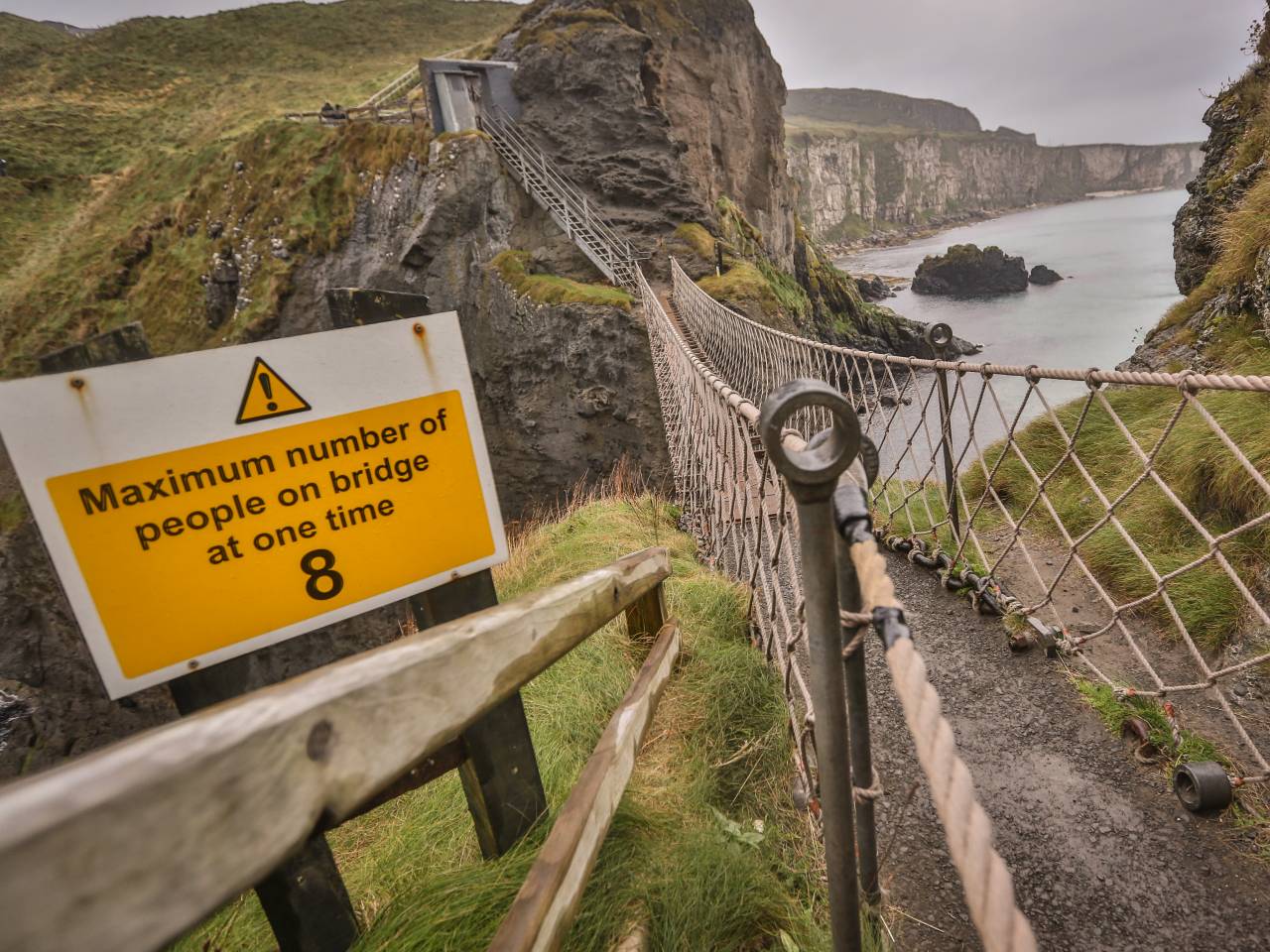 Tony Webster / Flickr
Tony Webster / Flickr
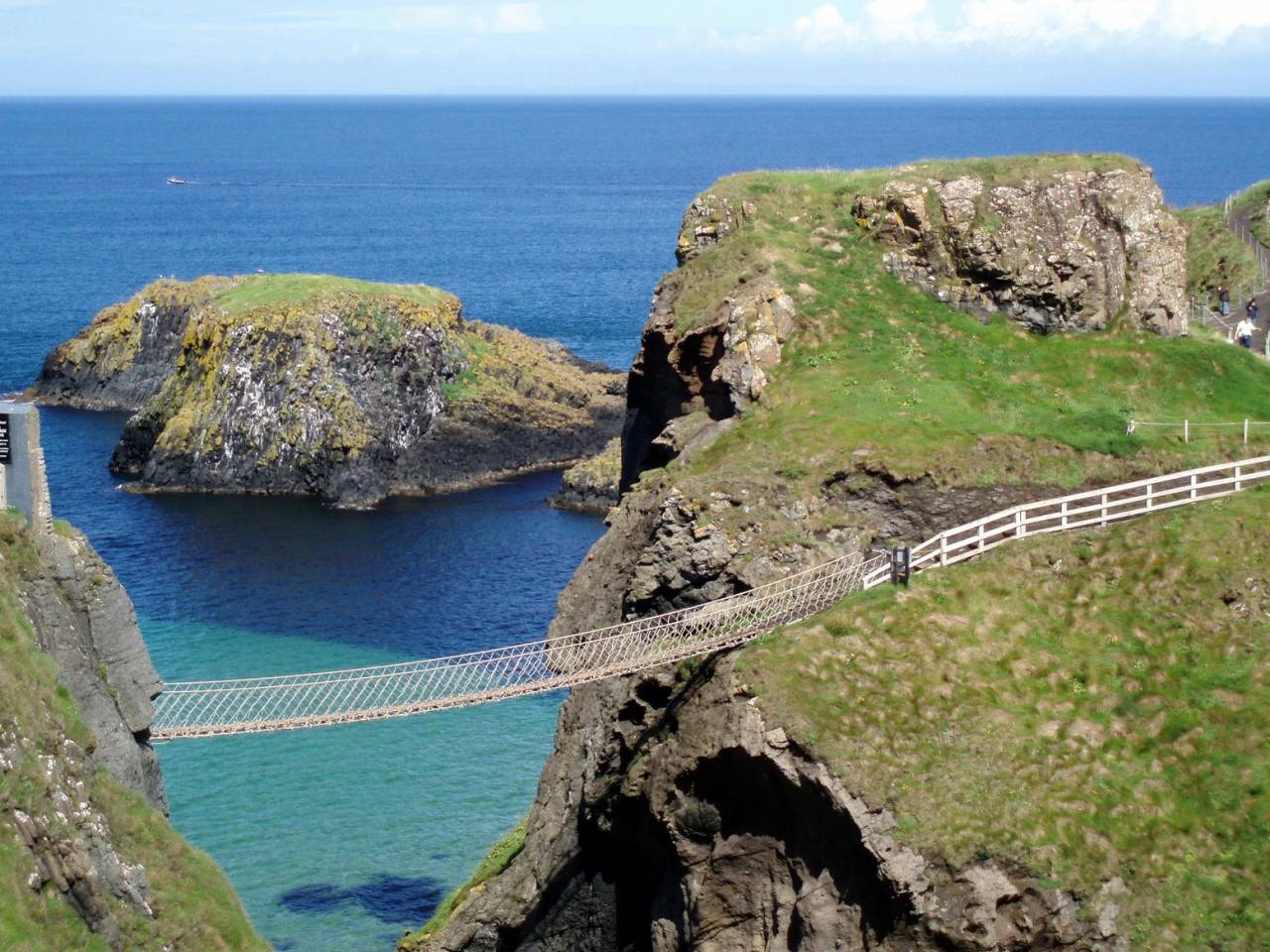 Shiraz Chakera / Flickr
Shiraz Chakera / Flickr
This rope bridge was first used by salmon fishermen all the way back in 1755, connecting the tiny Carrick island to the mainland.
It’s far sturdier than it used to be — in the 1970s it was made up of a series of wooden planks and a single guide rope. Now, it is supported by steel wires and rope, but still makes for a scary crossing, swaying almost 100 feet above the ocean.
Some adventurers haven’t been able to stomach the 60-foot journey across the bridge, opting to be ferried across by boat instead, claims travel site Atlas Obscura.
20. Lake Pontchartrain Causeway, U.S.A.
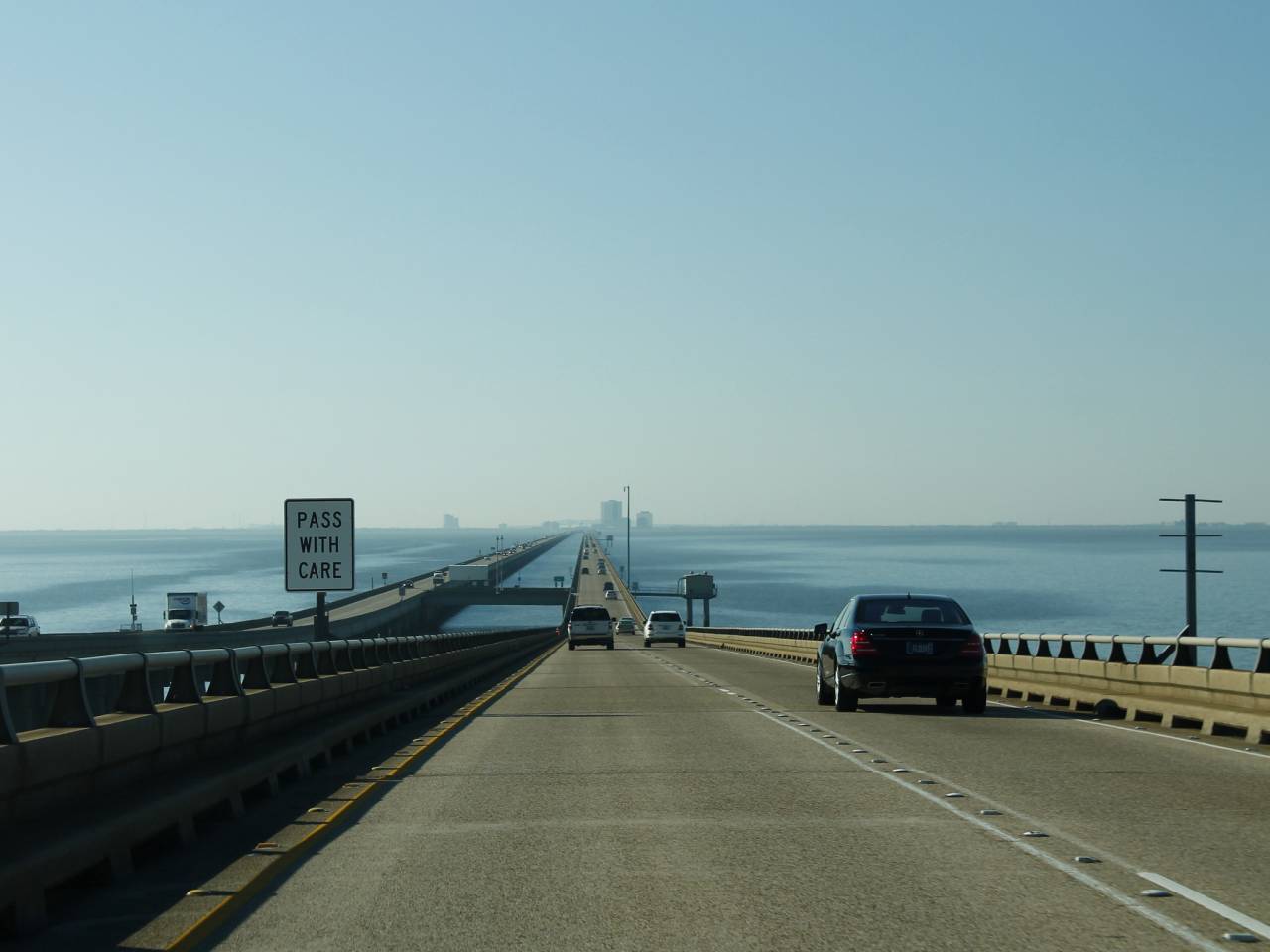 formulanone / Flickr
formulanone / Flickr
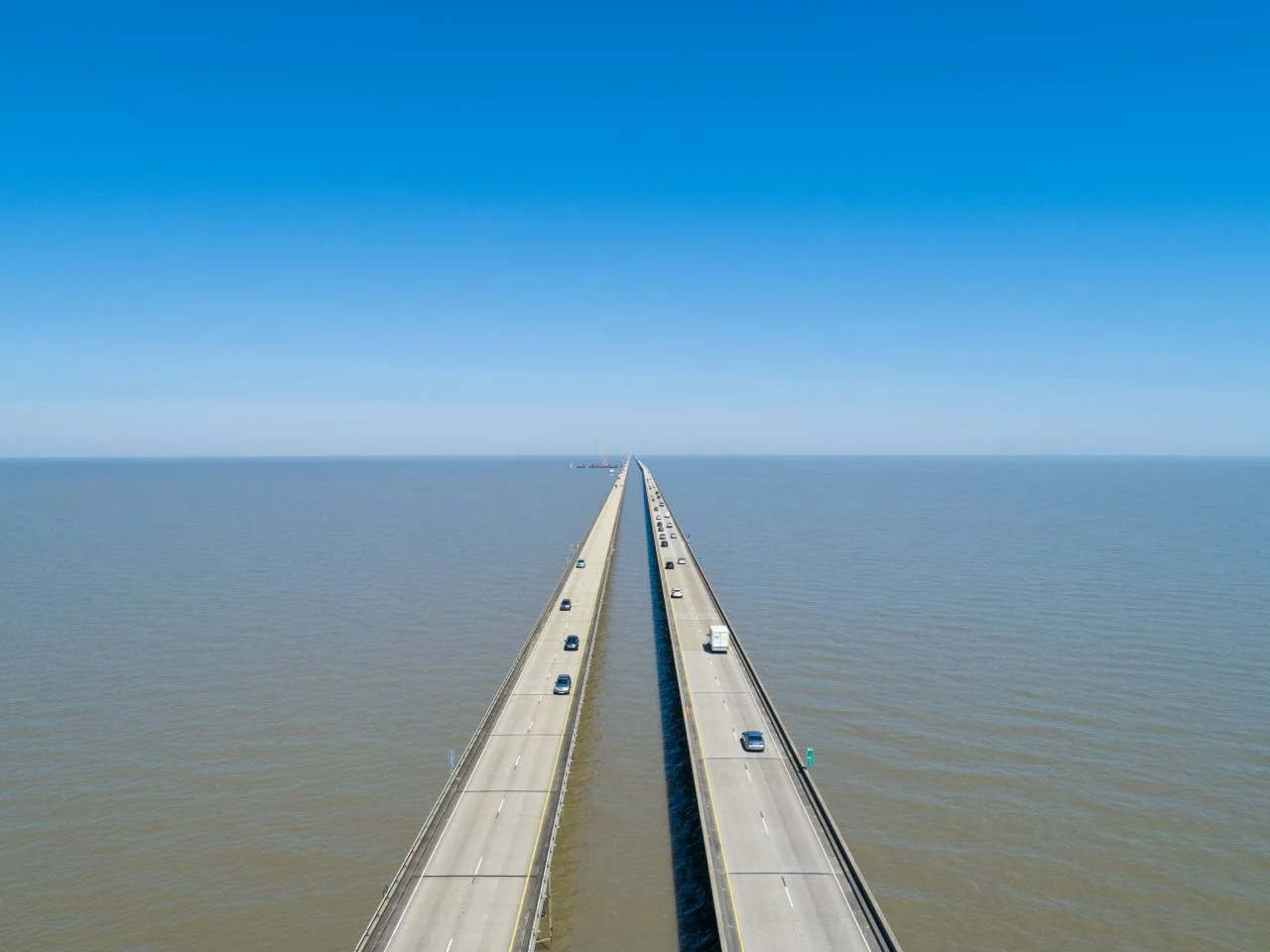 Mark Runde / Shutterstock
Mark Runde / Shutterstock
You thought the Seven Mile Bridge was bad? Try the 24-mile Lake Pontchartrain Causeway in New Orleans, which holds the world record for being the longest continuous bridge over water in the world.
The first two-lane span of the bridge was constructed in the 1950s to provide a direct connection from the center of Lake Pontchartrain to its northern shore, so travelers wouldn’t have to drive around to access both ends of the city. The second span was added in 1969 to ease traffic.
Some drivers have been known to freeze over the causeway. The bridge is so long, they lose sight of land and feel as though they’re suspended in the middle of the water and bridge police have had to escort them to the other side. Women have even given birth over the causeway, after failing to cross it in time.
21. Capilano Suspension Bridge, Canada
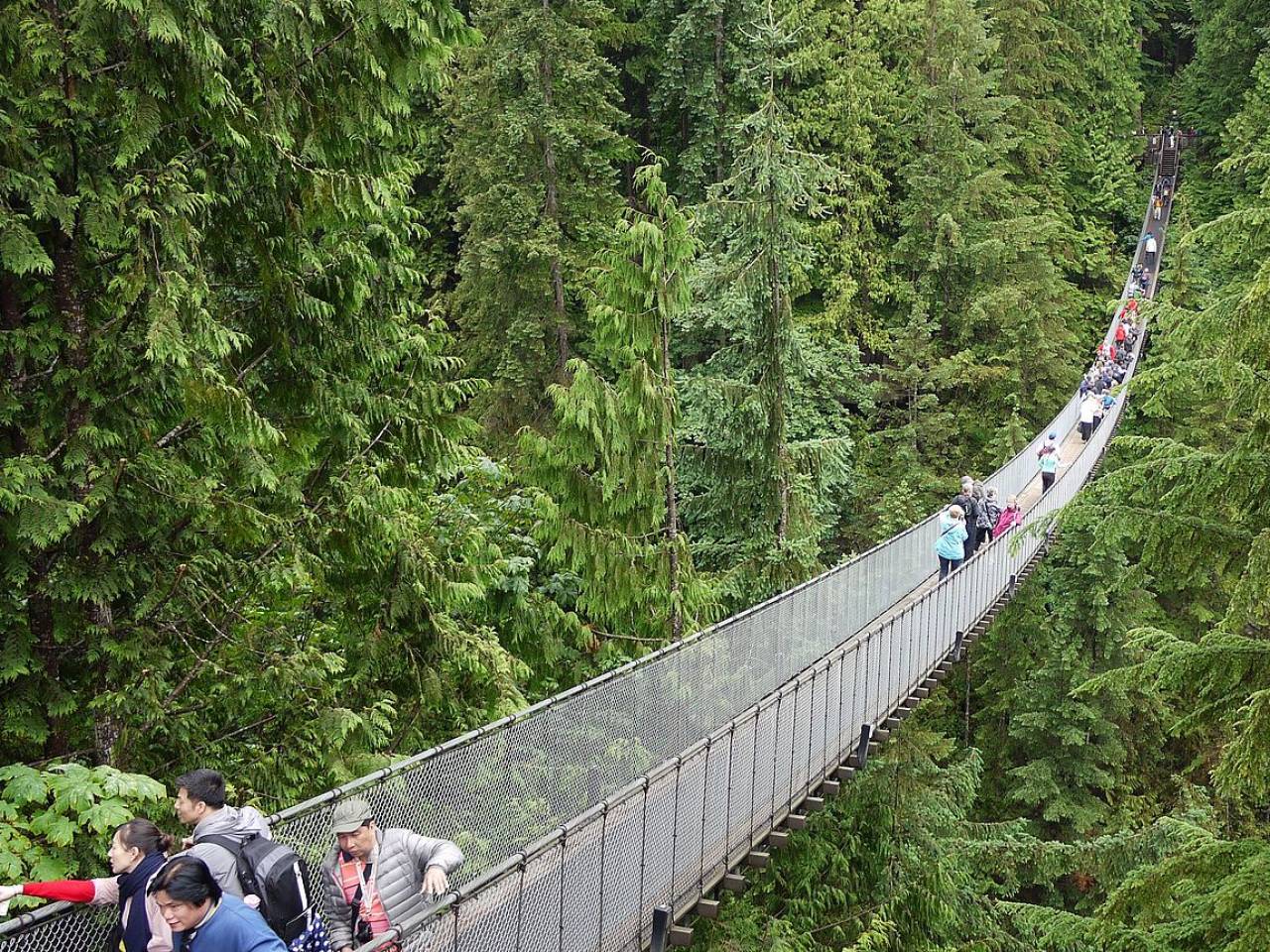 Markus Säynevirta / Wikimedia Commons
Markus Säynevirta / Wikimedia Commons
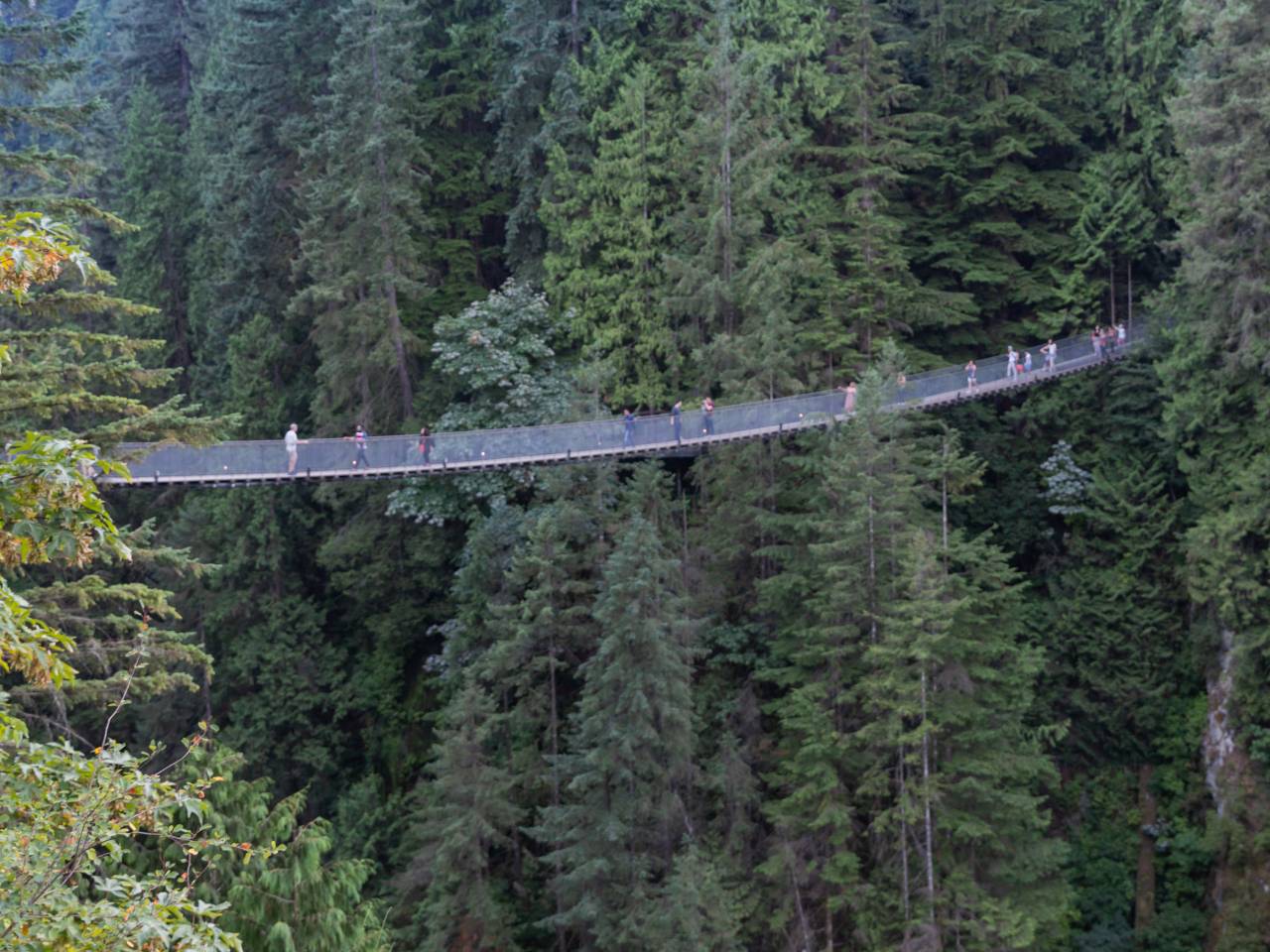 dronepicr / Flickr
dronepicr / Flickr
Just 15 minutes away from downtown Vancouver in British Columbia, this wobbly 450-foot bridge is suspended 230 feet above the Capilano River.
First built in 1889 with cables made out of hemp ropes, the Capilano Suspension Bridge has since been replaced with cables “strong enough to hold up a fully loaded 747 airliner,” according to the Capilano Suspension Bridge Park website.
22. Monkey Bridges, Vietnam
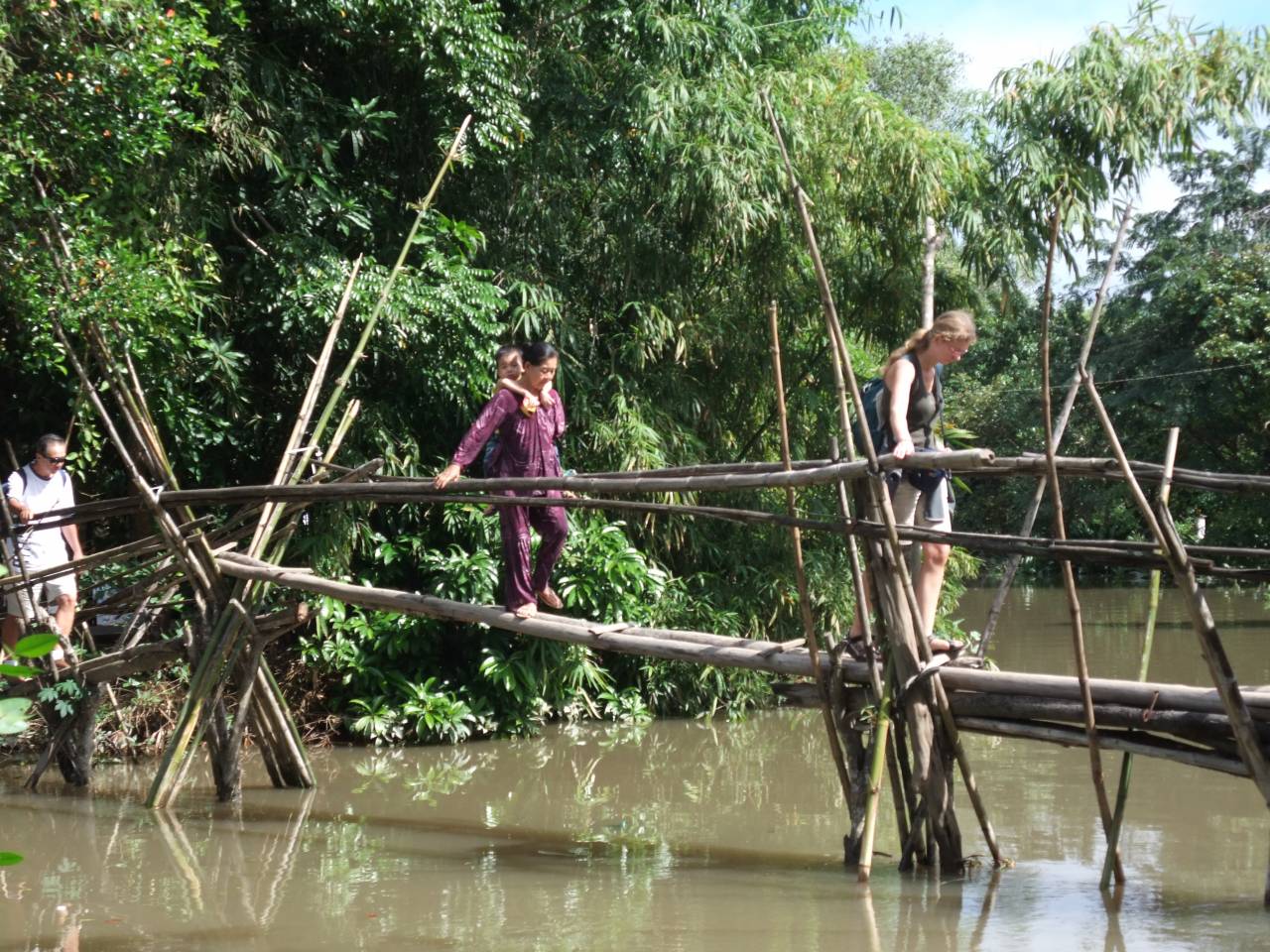 Yun Huang Yong / Flickr
Yun Huang Yong / Flickr
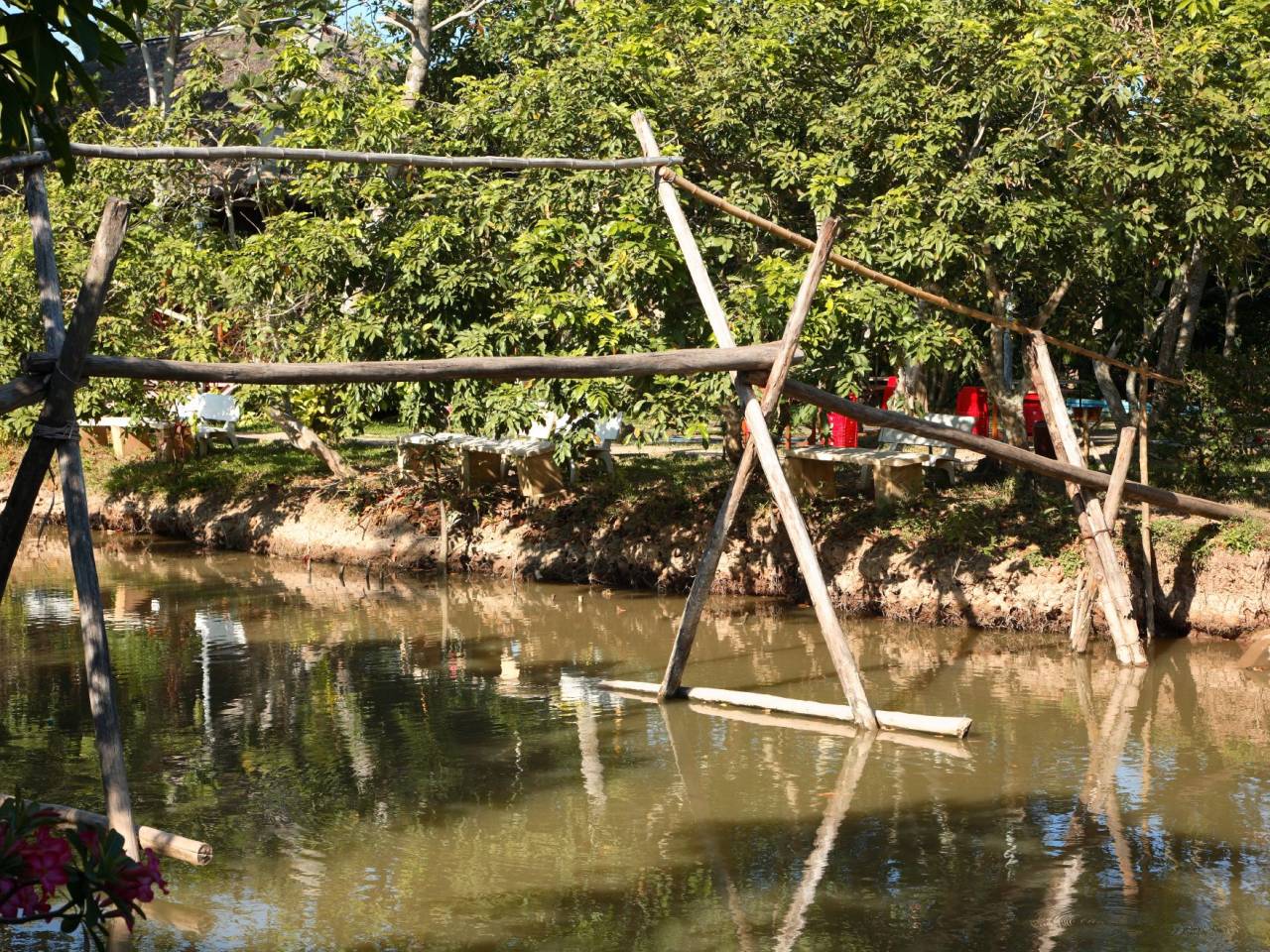 kkinjo / Flickr
kkinjo / Flickr
These precarious stick bridges in the Mekong Delta region in Southern Vietnam are a popular tourist attraction — for those of us who aren’t afraid of plunging into the canals below.
The cầu khỉ, or Monkey Bridges, consist of uneven bamboo logs that are about 12 to 30 inches wide. They have an additional log for travelers to grip onto as they make the treacherous journey across.
These flimsy bridges help connect small villages to main roads, and although they’re being replaced with safer concrete structures, visitors can still opt to take the riskier route “just for fun”.
23. Geierlay Suspension Bridge, Germany
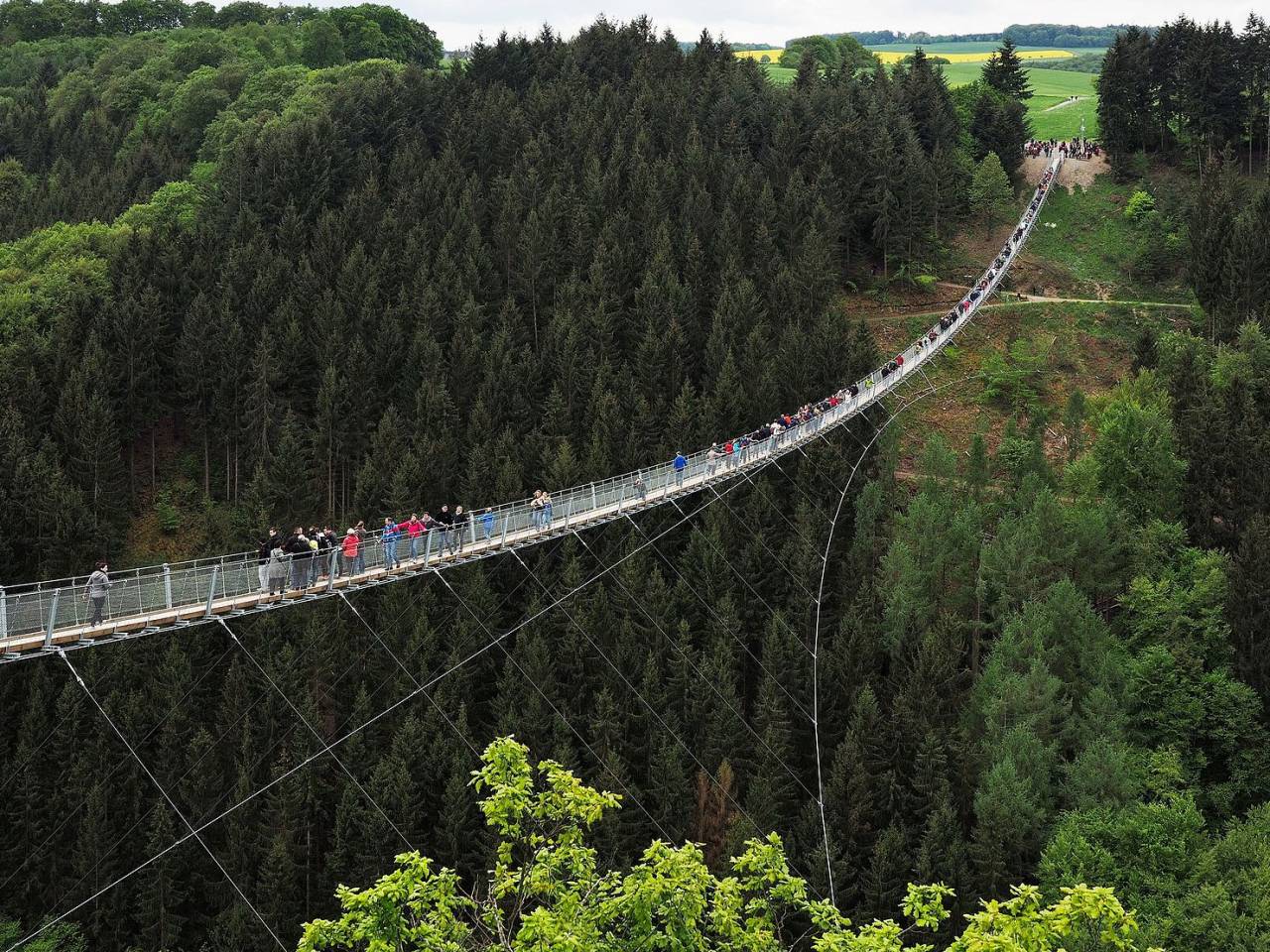 Kreuzschnabel / Wikimedia Commons
Kreuzschnabel / Wikimedia Commons
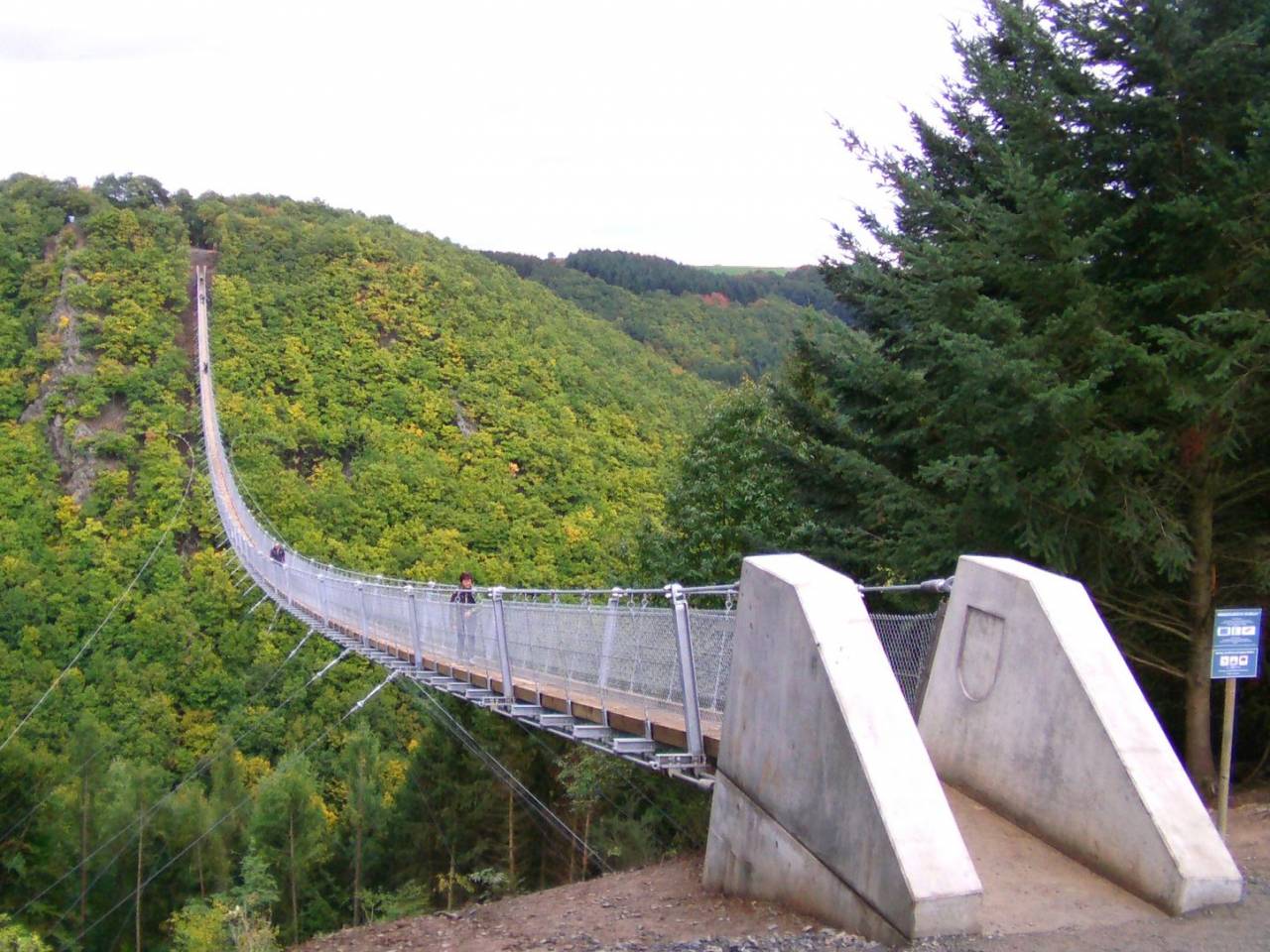 M.Ahmad Hussnain / Wikimedia Commons
M.Ahmad Hussnain / Wikimedia Commons
Enjoy panoramic views of a deep green valley and the surrounding mountains on the Geierlay Suspension Bridge in the Hunsrück.
This pedestrian bridge, linking the municipalities of Sosberg and Mörsdorf, spans almost 1,200 feet and hangs over 300 feet above the ground. When it first opened in 2015, it was considered Germany’s longest suspension bridge, although the Titan RT in the Harz Mountains has since usurped that position.
“Around 10% do set foot on the bridge, but then turn back again,” local mayor Marcus Kirchhoff told German lifestyle site AllesGerman. “A further 20% of the people don’t even go onto the bridge. They sit themselves down by the valley and just watch.”
24. Windsor Suspension Bridge, Gibraltar
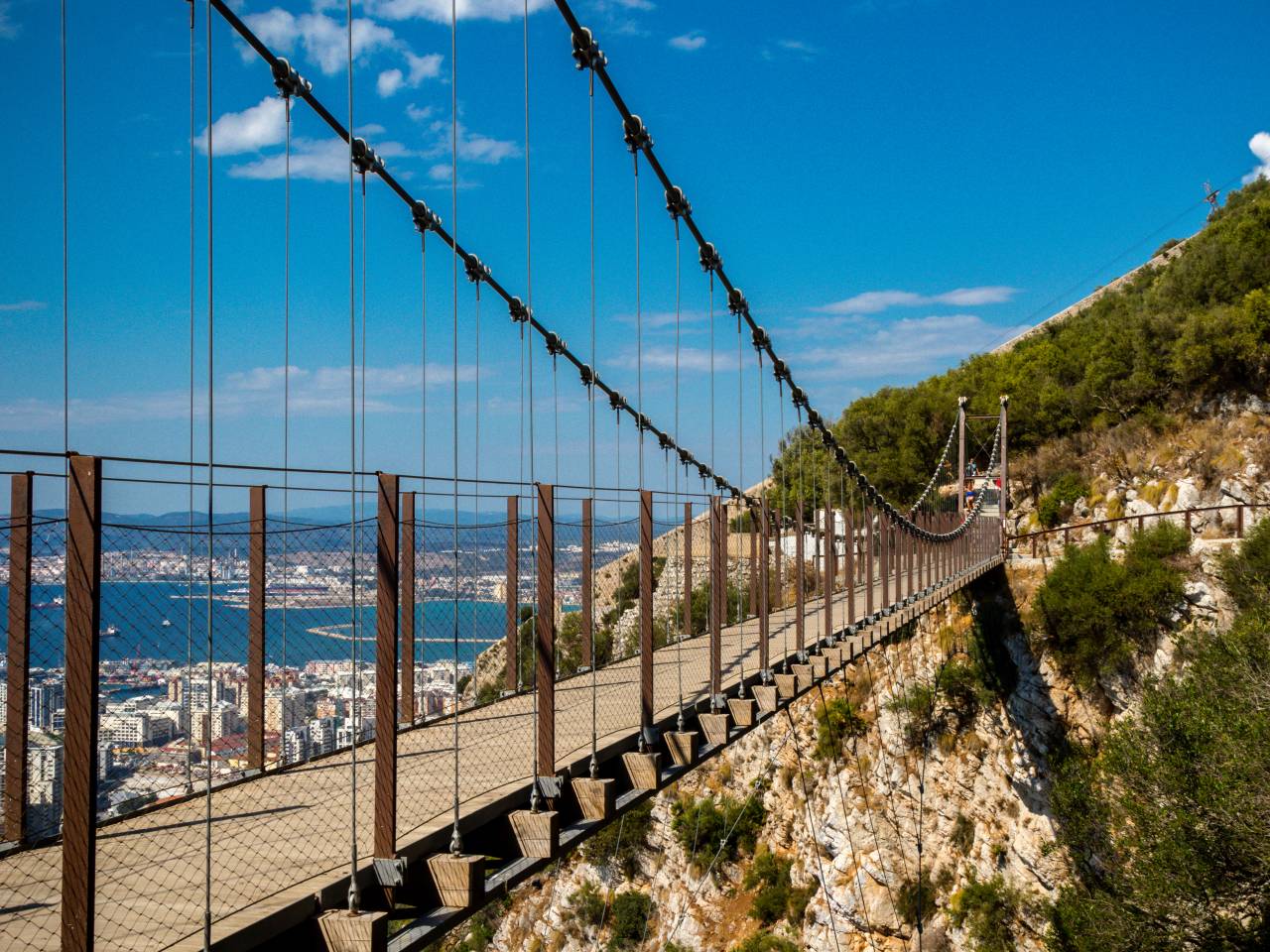 Ben Gingell / Shutterstock.com
Ben Gingell / Shutterstock.com
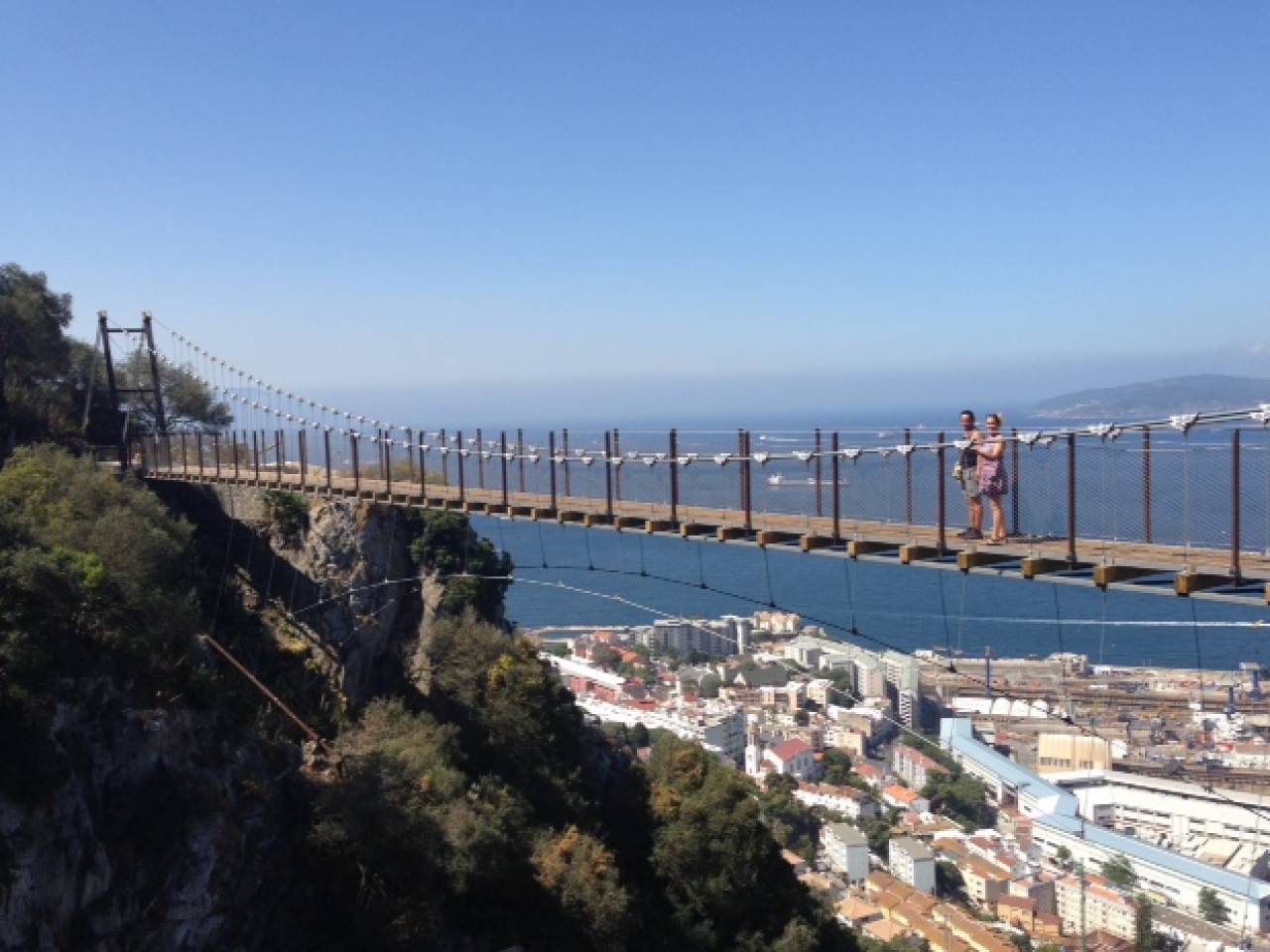 Anuradha Ratnaweera / Flickr
Anuradha Ratnaweera / Flickr
Bring your camera and snap some photos of the gorgeous views over the city and bay in Gibraltar — if you can stomach the height, of course.
The 232-foot suspension bridge officially opened in 2016 in the scenic Upper Rock Nature Reserve, which also includes several trails. It hangs over a 164-foot deep gorge and is entrenched into the ground on either side by supporting anchors.
The Gibraltar tourism website says to keep in mind that, “any slight turbulence, if felt, will only enhance the thrill seeker’s experience” over the Windsor Suspension Bridge.







